
REGIS.EDU VOLUME 31 ISSUE 1
2023 LIVING THE MISSION HUE'S CLUES SLAVERY TO SAINTHOOD Uniting to aid refugees seeking peace and hope / 22 Solving brown, pink and white noise mysteries / 14 Regis' surprising connection to a devout benefactor of the poor / 18
SPRING/SUMMER
Regis University Magazine is published biannually by Marketing and Communications for the University community of alumni, benefactors, faculty, staff, students and families.
ASSOCIATE VICE PRESIDENT
MARKETING AND COMMUNICATIONS
Todd Cohen
EDITOR
Karen Augé
DIRECTOR OF BRAND STRATEGY AND DESIGN
Sarah Foley
DIRECTOR OF COMMUNICATIONS
Sheryl Tirol
SENIOR ART DIRECTOR
Marcus Knodle
EDITORIAL STAFF
McKenna Solomon
Sara Knuth
ILLUSTRATION
Dan Alarcon Jr.
PHOTOGRAPHER
Skip Stewart
CONTRIBUTORS
Jacob Garcia
Barry "Bear" Gutierrez
Christian Murdock
Billy J. Saunders
Meredith Sell
Brett Stakelin
On the Cover: The Nuñez-Pulgar family fled Venezuela to seek safety in the United States. At Regis' Welcome Center they found that, as well as comfort, caring and community.
SHARE YOUR THOUGHTS
email: editor@regis.edu
mail: Regis University Magazine, L-27
3333 Regis Blvd., Denver CO 80221
Make a Gift to Regis call: 303.964.3608
visit: give.regis.edu
Learn About Upcoming Events visit: regis.edu/events-calendar
follow us: facebook.com/regisuniversity
Advance your Education visit: regis.edu/apply
call: 800.944.7667
email: ruadmissions@regis.edu
Regis University supports a more sustainable environment. Please recycle this magazine when finished reading.
FEATURES
HISTORIC PRESIDENCY 12
A conversation with Regis' first lay and Latino president.
SOUND AND COLOR 14
Regis professor studies therapeutic effects of white and brown noise.
CANONIZATION CANDIDATE 18
Inspired by faith, Julia Greeley helped the poor despite her own poverty.

LIVING THE MISSION 22
Asylum seekers from Venezuela found hope and hospitality at Regis.
STUNNING SEASON 30
Women's basketball wins first conference title in 16 years.
FINDING PURPOSE BEHIND BARS 32
Virtual class transforms students on campus and in prison.
THE COST OF COMFORT 38
Instructor chronicles the sacrifice of artists at Ground Zero.
THIS IS REGIS
PRESIDENT'S MESSAGE 1
IN BRIEF 2
FACULTY FOCUS 4
FACULTY FEATS 6
LESSONS LEARNED 7
STUDENT VOICES 8
RISING STAR 10
ALWAYS RANGERS
WHY JESUIT MATTERS 41
RANGERS IN THE WORLD 42
CLASS NOTES 44 IN MEMORIAM 46 ASK REGI 48
3 Spring /Summer 2023 | REGIS UNIVERSITY MAGAZINE
VOLUME 31 ISSUE 1 SPRING/SUMMER 2023
Massive stained glass windows shine light on the tomb of Julia Greeley, the only person interred at the Cathedral Basilica of the Immaculate Conception in Denver.
MESSAGE FROM THE PRESIDENT
Dear Regis Community,
As the first lay, and first Latino, president in Regis University’s 146-year history, I am acutely aware of the responsibility and opportunity that comes with shepherding the University, and honoring its JesuitCatholic mission, through times of great challenge, opportunity, and change.

I am pleased to report that, in the first months of my tenure, we have marked the achievement of several important milestones including:
Moving forward on strategic plan formulation. In February 2022, we started working on the plan by creating a strategic planning framework. A significant milestone in the planning process is the selecting of the pillars which will support and sustain the strategic plan. We are on track to bring the strategic plan to the Board of Trustees at the September 2023 meeting. We are committed to building upon our innovative academic programs in the spirit of inclusion and prayerful consideration of our Jesuit mission and values.
Being designated a Hispanic Serving Institution (HSI). This federal distinction represents our progress in becoming a more diverse institution, and in reflecting our community’s evolving demographics. It is a tremendous honor as we are one of only two Jesuit universities to earn
HSI. At the same time, it reminds us of the remaining work we must do to become more inclusive and thoughtful in serving all our students.
Launching an accelerated degree track for pharmacy students. Beginning this fall, Doctor of Pharmacy students can earn their degree in three years rather than four. In addition, we are excited to offer a $40,000 award distributed over the years of a student’s enrollment; free housing for the first academic year; a $1,000 stipend to cover travel and expenses for out-of-state students and a $500 stipend for in-state students.
Securing more than $365,000 in new GLOBAL scholarship funding. Denver County and residential students from across the country who enroll in the University’s groundbreaking GLOBAL Inclusive Program will be eligible for the scholarships. The program is one of only two post-secondary programs offered at Jesuit universities for students with intellectual disabilities. It is a collaboration between Global Down Syndrome Foundation, Regis, and the Anna and John J. Sie Foundation.
I am honored to lead Regis University as we embark on this challenging but hope-filled journey.
Kindly,
Salvador Aceves, Ed.D.
REGIS.EDU 1 PRESIDENT'S MESSAGE | THIS IS REGIS
FAST-TRACKING PHARMACISTS
Starting this fall, Regis Pharm.D. students may be able to get those lab coats on and get started on their careers a year earlier. School of Pharmacy Dean Samit Shah, Ph.D. has announced plans to offer an accelerated three-year program — required coursework stays the same, students simply complete it faster. The accelerated option is expected to be approved by the Accreditation Council for Pharmacy Education (ACPE) this summer. In addition, Regis will offer free housing to first year Pharm.D. students and every student admitted to the program in 2023 will get $10,000-a-year scholarship for four years. Out-of-state students will receive additional financial help.

REGIS NAMED A HISPANIC SERVING INSTITUTION
Regis has been designated a Hispanic Serving Institution (HSI), a federal distinction shared by just over 10 percent of colleges and universities in the United States. The designation requires a Hispanic student enrollment of at least 25 percent — at Regis, the figure is 28 percent of fulltime undergraduates — and affirms the University’s commitment to serve, support and celebrate its diverse student body. Regis is developing plans to fully embrace the opportunities the designation brings. Those opportunities include “supporting initiatives that will shape a more accessible, inclusive, and culturally enhancing educational experience for Hispanic students,” said Nicki Gonzales, vice provost of diversity and inclusion.
LIFE-SAVING SMARTS
CLOSING BEHAVIORAL HEALTH GAPS
This spring, Regis faculty and students added their voices to the statewide conversation about providing better access to behavioral health services. Dr. Morgan Medlock, who at the time was serving as the first commissioner of the state’s new Behavioral Health Administration, visited Regis’ Thornton campus in March. There, she joined Rueckert-Hartman College for Health Professions leaders, including Academic Dean Linda Osterlund, Ph.D., to tour the Regis Center for Counseling and Family Therapy and the nursing skills lab. The leaders discussed how Regis can be part of the agency’s vision to serve more children and families.
Regis faculty and a Denver startup won a grant to develop a system that will put artificial intelligence to work saving lives. SimWerx and Anderson College of Business and Computing faculty members Christy Pearson, Mike Busch and Doug Hart, with University of Washington faculty member Austin Baird, were awarded a grant of $206,000 over 10 months through a U.S. Department of Defense Small Business Technology Transfer (STTR) program. The plan is to develop an AI system to help field medics make clinical decisions.

2 Spring /Summer 2023 | REGIS UNIVERSITY MAGAZINE
IN BRIEF THIS IS REGIS | IN BRIEF
PRIZE-WINNING PAIR
A Regis student and a professor have won prestigious Fulbright awards. In April, Mayra Perez-Ruiz learned she had become the first Regis student to be awarded a Fulbright. She plans to travel to Spain for nine months, where she will become an English teaching assistant. Professor and Division of Education Chair Elizabeth Grassi will be in Norway for one year, researching language acquisition with the Norwegian Center for Foreign Languages. She also will visit Norwegian schools to observe how they teach and study language acquisition with immigrant and refugee students.
MORE GOALS THAN YOU CAN SHAKE A STICK AT
Two lacrosse standouts, 2022 Regis graduate Kyleigh Peoples and Regis freshman Shea Murphy, were honored as 2022 Sportswomen of Colorado at the 49th annual award ceremony this spring. Peoples is a two-time All-American and a three-time Rocky Mountain Athletic Conference attacker of the year. Her skills helped Regis advance to two national semi-final games during her career. Murphy was recognized as a two-time All-State selection, leading Lakewood, Colo.’s Green Mountain High School to its first 4A State Championship, scoring nine goals to help secure the title.

ALL WORK IN A CLASSIC PLAY
Sophomore Dan Zill took a break from his physics and math studies this spring to star as Franklin Hart Jr. in the Regis Ramblers’ production of 9 to 5: The Musical. The stage musical version of the classic movie about workplace sexism and revenge featured music and lyrics by Dolly Parton. In addition to Zill, the musical featured junior Laura Colcernian as Violet, freshman Madelyn Parker as Doralee and Alexandria Bernhardt as Judy.
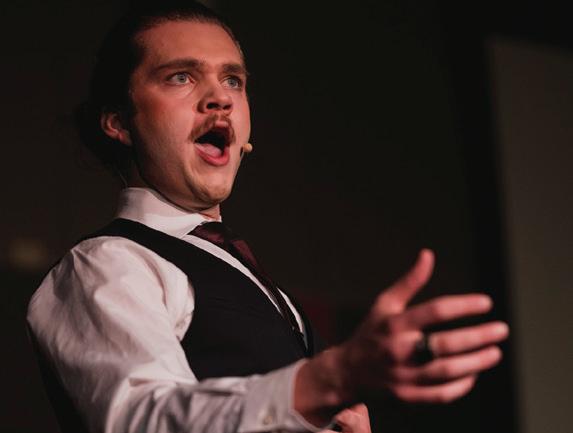
NEW, FAMILIAR FACES TAKE THE HELM

The president isn’t Regis’ only new leader. Jake Bucher (left), dean of the College of Applied Sciences at Dominican University near Chicago, succeeds Karen Riley as provost. Riley was named president of Slippery Rock University. Bucher, a sociologist, researches social injustice and experiences of marginalized groups. In the field house, alumnus Thomas Gilhooly (right) is now associate vice president and athletic director. Gilhooly, 1991 Colorado high school player of the year and first-team All-American, was a member of Colorado’s first national championship soccer team. He coaches soccer at Regis Jesuit High School.
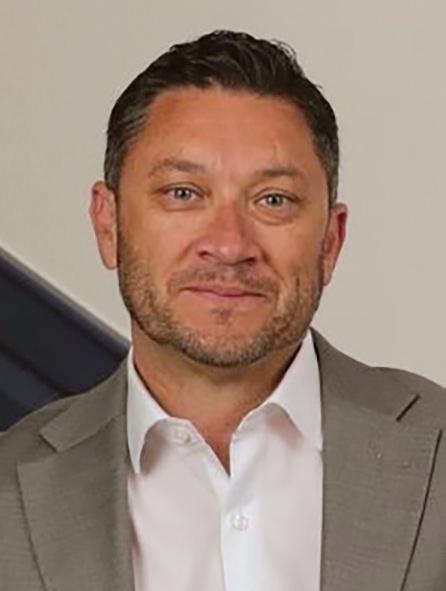
REGIS.EDU 3 IN BRIEF | THIS IS REGIS
COP TURNED PROFESSOR MAKES CRIME A CLASSROOM FAVORITE
After 20 years in a Regis classroom, Associate Prof. Don Lindley still packs them in. His criminology guest speaker series draws standing-roomonly crowds. His class on sexual homicide is so popular he holds it in an amphitheater.
And no wonder. He regales students — as many as 120 per class — with truecrime stories of his undercover years on the Denver Police Department’s vice squad. And, because he knows practically everyone in Denver law enforcement, he brings in notable guest speakers.

“I bring in the police chiefs, I bring in [former Denver District Attorney Mitch] Morrissey. I bring in victims, because they are the least to be addressed. I bring in people who care for victims after the fact. But they don’t stay around long. They’re not funded like they should be,” he said.
There is one element of the sexual violence equation he excludes. “I don’t bring in perpetrators. I don’t like the idea of that, and I don’t know what they’re capable of.”
Lindley can’t explain the surging popularity of true-crime podcasts, TV shows and college courses. But he has a theory. “I think if they didn’t show…bad people being arrested, they wouldn’t be so popular,” he said. “I think people like seeing the winning.”
Much has changed in the two decades since Lindley joined Regis and began creating criminal justice courses.
Among students, he’s seeing a shift toward more interest in federal law enforcement careers rather than
local departments. That’s just one more challenge those departments face, he said.
“It’s a tough time now for local law enforcement, but it’ll pass. When I started in ’72, it was the end of the ‘60s – the Vietnam War, drug culture, riots and protests.” Police were widely unpopular, but that, too, passed.
Lindley grew up in Steamboat Springs at a time when it was more a town than a ski resort. His parents divorced when he was 12, “and I pretty much had to fend for myself after that, and school wasn’t a priority.” That is the explanation offered by a man who’s spent four decades teaching for why he flunked out of high school.
4 Spring /Summer 2023 | REGIS UNIVERSITY MAGAZINE
THIS IS REGIS | FACULTY FOCUS
Photo: Skip Stewart
He joined the Navy, and somehow, while trolling the Saigon River at the height of the Vietnam War, earned his high school equivalency.
After the Navy, he came home, got a degree at what is now Western Colorado University in Gunnison, Colo., and taught special education at Steamboat Springs High School, alongside some of the teachers who flunked him. “There were some dumbfounded faces,” among his fellow faculty.
Soon, he embarked on his second career: police work. In Denver, he eventually found himself working nights, under cover, buying drugs and arresting pimps and prostitutes on east Colfax Avenue and around the Capitol.
Even as police killings of unarmed suspects prompts outrage and calls for reform, Lindley is unapologetic
in his defense of police training, and unabashed in his criticism of those he calls “idiot” politicians.
“‘Defund the police’ — that’s a stupid thing to say. Now we’re on this roller coaster where we’re condemning law enforcement and now they are backtracking and not doing the job because they get slammed. When citizens lose respect for officers that is a danger,” he said.
But asked if departments are getting better at weeding out potential rogue, violent cops, his answer is a quick “No.” In fact, he believes standards have been lowered, in effort to attract more recruits.
In his experience, policing was tough, it was ugly, it was often violent and sometimes brutal. But it was also, in a way, thrilling.
Putting his own spin on Winston Churchill’s line, Lindley said, “there’s
nothing as exciting as being shot at without result.”
Now, though, he’s had enough of that. Organizing the 21st annual CSI: Regis Conference, Lindley said, he grew weary. Audiences, though, aren’t. The April event drew hundreds to the Northwest Denver Campus, to hear from the man who prosecuted suspected New Mexico serial killer and convicted serial rapist David Parker Ray. Despite the series’ popularity Lindley insists he’s ready for retirement.
His future excitement will come from restoring cars from a time when they were as distinctive and colorful as Lindley himself: a `55 red and white Chevy Bel Air hard top, a yellow ’64 Mustang convertible and a 1950 Ford.
Prowling the streets in a classic Mustang may be a thrill, but it doesn’t get the heart racing quite as much as skulking around Denver’s seedy underbelly, making undercover drug buys, or recounting those adventures to enthralled undergraduates. But Lindley said he’s OK with letting all that go.
“I’m close to 80 years old. I’ve been teaching college for 40 years. I’ve enjoyed it. But you get tired.” –KA

REGIS.EDU 5 FACULTY FOCUS | THIS IS REGIS
Don Lindley didn't just bring crime tales to Regis. For years, Lindley and his cotton candy machine sweetened campus events.
Photo: Brett Stakelin
FACULTY feats
Geoffrey W. Bateman, Ph.D., associate professor, Regis College, published an article in Vocation Matters titled “Supporting LGBTQIA+ Students in the Pursuit of Meaningful Work.”
David Bauman, Ph.D., assistant professor of business, received a grant from Georgetown University to run “Do Something Good” projects. With the grants, student teams developed projects using up to $100 to do good for college or community groups. They could not simply give the money to charity. In the fall, teams’ good deeds included a Mario Kart competition that raised $160 for Ronald McDonald House to support Ukrainian children; and raising more than $300 through a soccer/volleyball event for Single Ventricle Clinic of Colorado.
Raul Dominguez, Ph.D., Regis’ director of choral activities, conducted the 120-member Denver Gay Men’s Chorus in the national anthem as Regis alumna Lt. Gov. Dianne Primavera, and her boss, Gov. Jared Polis, were inaugurated for a second term this past January. Dominguez is director of the Denver chorus, which invited the Colorado Springs gay men’s chorus, OutLoud, to join them at the Capitol for the ceremony. The gesture was a show of support and tribute to those killed, injured or impacted by the November 2022 Club Q massacre in Colorado Springs.
Benjamin T. Finlayson, Ph.D., assistant professor in the Division of Counseling and Family Therapy, presented at Utah State University’s 25th Annual Marriage Celebration Conference. He led a one-hour workshop entitled: “The Grass Isn’t Greener, It’s Astroturf: (Re)Embracing Creativity in Relationships.”
Jude D. Fokwang, Ph.D., associate professor, Regis College, published the book, Cultivating Moral Citizenship: An Ethnography of Young People’s Associations, Gender, and Social Adulthood in the Cameroon Grasslands. Visit Cultivating Moral Citizenship – Spears Books (spearsmedia.com) to learn more.
Abby Gosselin, Ph.D., is the author of Mental Patient: Psychiatric Ethics from a Patient's Perspective, published by MIT Press (mitpress.mit.edu). In the book, Gosselin, a philosophy professor, describes her experience with psychosis and treatment, and how positive relationships with her mental health providers helped restore her health and autonomy.

Alyse Knorr, Regis College associate professor of English, released her latest book, GoldenEye007. The book tells the story of the Nintendo 64 game based on James Bond films that reignited a genre of games after it was released in 1997.


John O’Malley, Ph.D., assistant professor in the Division of Counseling and Family Therapy, was an invited speaker at the Nebraska Cultural Unity Conference in Kearny, Neb., on March 31. His topic was “Dive into Diversity: Navigating a World of Difference with Confidence.”
Trudi Wright, Ph.D., music program director and associate professor, was appointed co-editor of the journal Open Access Musicology, a journal intended for undergraduate music classroom use. Each article is double-blind reviewed and reviewed by undergraduate students.
Erika T. Wurth's novel, White Horse, has been chosen as a New York Times editor’s pick and a Good Morning, America Buzz Pick, among other honors. The novel is about an indigenous woman confronting ghosts – actual and symbolic – as she tries to solve a mystery surrounding her mother. Wurth is an affiliate writing instructor in the Mile High MFA program.
6 Spring /Summer 2023 | REGIS UNIVERSITY MAGAZINE THIS IS REGIS | FACULTY FEATS
410E/ENVS 438
THAT’S GARBAGE!
ABOUT THE COURSE:
We will fall in love with the paradox of garbage and waste – a rich history, a global environmental disaster, an uncertain future, an untapped resource.
INSTRUCTOR:
Eve Passerini, Ph.D., professor of sociology and director of the Integrative Core.
STUDENTS ARE:
Undergraduates, majoring in any and all subjects.
TEXTS AND MATERIALS:
“Forget Shorter Showers,” by Derrick Jensen, Orion magazine. “How to Stop Humans from Filling the World with Trash,” by Alana Semuels, from Atlantic magazine, July/August 2015.
“Climate Change and Hope,” by Maria Ojala, accessible on the United Nations Educational, Scientific and Cultural Organization website.
CLASSWORK:
Students choose three projects from the four options below. For each, students create an informative, interesting, potent PowerPoint, digital story or vlog.
Waste: The average person in the United States generates 20 pounds of trash a week. Collect and carry your trash for one week, and research municipal waste.

Food: United Nations studies show a plant-based diet provides “major opportunities” to address climate change. For a week, go vegetarian, vegan, eat less processed or more whole foods, or eat more local or organic food. What role does culture play in your ability to change or not?
Toxic Communities: Choose a city you are familiar with and research polluters and their locations, type and prevalence of pollutants, Superfund sites, cleanliness of water and air, and the percentage of homes with high lead in that city. Research industry, environmental justice and your own religious, spiritual, or humanistic ethics.
New Ideas or Professions: Choose to research/explain a new concept or theory related to class, or research how your chosen profession or major contributes to environmental waste solutions.
MAJOR LESSONS LEARNED:
Students gain experience researching, defining, distilling, and writing skillfully about controversies, facts, convictions, concerns and revelations. They learn meaningful reflection and become equipped to take action. They become empowered as critical owners and producers (not just passive consumers) of digital media.
LESSONS LEARNED | THIS IS REGIS RCC
What excites you most about your major?
name : Jazzel Garda-Pinera
graduating year : 2025
major : Politics, Peace and Justice Studies



answer : “The things I learn in class and implementing them into real world experiences and creating social awareness around those."
name : James Pajela
graduating year : 2025
major : Pre-Pharmacy
answer : “I've always been interested in chemistry, so taking O-Chem right now excites me."
name : Madeleine Swietlik
name : Tristan Chavez
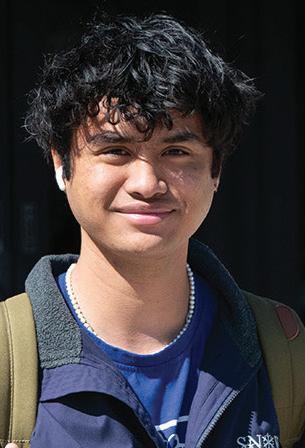
graduating year : 2023
major : Computer Science
answer : “That I'll be doing work developing things other people use. I like the idea of being able to make a difference in people's lives like that."
name : Josh Davis

graduating year : 2023

major : Communication, Peace and Justice Studies
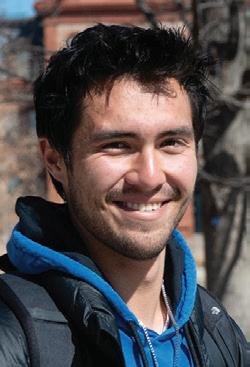
answer : “Peace and Justice Studies...enables you to apply a lens to whatever else you're studying. How can you do stuff like be a press secretary ethically?
What does it look like to actually do things that make a difference and have the public be engaged?"
name : Kate Murphy
graduating year : 2025
major : Nursing
answer : “Getting out in the world and being able to work anywhere and help people with the resources I've acquired here at Regis.”
graduating year : 2024

major : Criminal Justice
answer : “Getting to learn about different populations and how the law affects them, and...learning the history behind those laws and causes of the prejudices that exist today. ”
name : Genavieve Szumsky
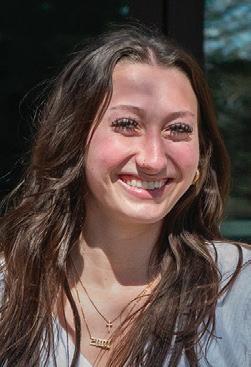
graduating year : 2025
major : Nursing
answer : “To give back to the community and to continue the Jesuit values I've gotten here. ”
name : CJ Reed

graduating year : 2025
major : Business Marketing
answer : “Learning about the finance world and how marketing works in the real world and applying that.”
8 Spring /Summer 2023 | REGIS UNIVERSITY MAGAZINE THIS IS REGIS | STUDENT VOICES
Photos: Jacob Garcia
Many






















































































































































































































































































































































































































































































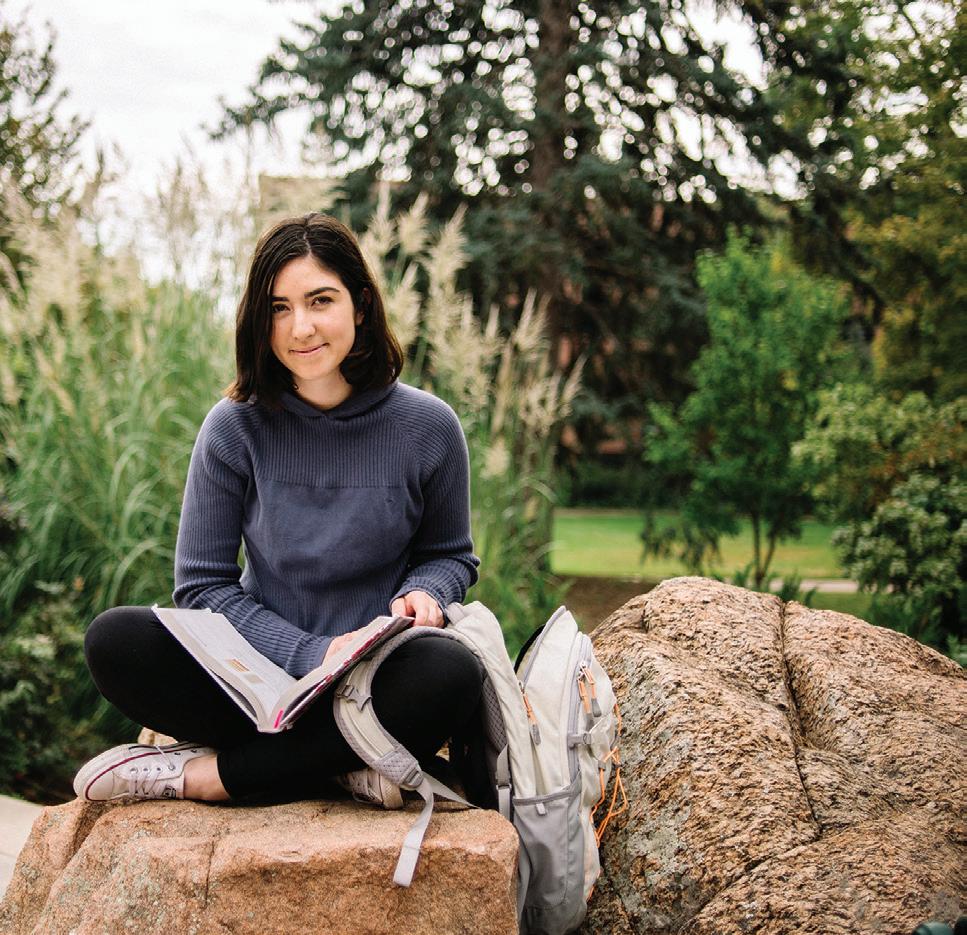
REGIS.EDU 9
One Day of Giving.
your generous support, we were able to raise over $275,000 for 26 projects this year. We are forever grateful! OUTDOOR MOVIE SERIES OPENS AT 6:30PM MOVIES BEGIN AT DUSK BRING YOUR BLANKETS & CHAIRS NO ALCOHOL • DOGS MUST BE LEASHED JUNE 9 VIVO JULY 14 SING AUGUST 11 SCHOOL OF ROCK FREE ADMISSION AND LIVE MUSIC presents REGIS UNIVERSITY 3333 REGIS BLVD. FREE PARKING IN LOT 3 AT 50TH AVE. AND LOWELL BLVD. 2023 FOOD AVAILABLE • PICNICS WELCOME Summer
Reasons to Thank You! With
FAITH AND INTERNATIONAL EDUCATION INSPIRE ASPIRING TEACHER
When some kids are asked what they want to be when they grow up, their answers might evolve from astronaut to basketball player to movie star. For MaryBeth Cabauy, the answer was always the same: teacher.
That’s because Cabauy, a Master’s of Elementary Education student at Regis, had a childhood filled with inspiration. Cabauy said her dad, a veteran music teacher, soccer coach and pastor, inspired her to follow his lead and become an educator, too. She’s been working toward that goal during her past two years at Regis.
“I got to see his love for teaching right there in front of me,” said Cabauy, who graduated in April. “He just had so much joy. When people would ask, ‘What do you want to be when you grew up?’ I just thought, ‘I want to be like him’ … It was always an inspiration and seemed like a way to have a lot of joy in your career.”
Cabauy won the most recent Pass the Torch Scholarship, administered by exam preparation company Teachers Test Prep. To win, Cabauy competed against four finalists from across the country, and was awarded $5,000 to be put toward living expenses, which financial aid typically doesn’t cover. For the competition, the students were asked to submit a video highlighting a teacher who inspired them. Cabauy chose to talk about her dad.
As much as Cabauy’s dad inspired her to become a teacher, she also found her own source of motivation when it came to deciding what direction her teaching career would take. Cabauy hopes to shape a diverse classroom experience, a priority since she was an undergraduate at Midwestern Baptist Theological Seminary’s Spurgeon College in Kansas City, Mo., where she earned a degree in intercultural studies. There, she participated in a study abroad program that sent her to India and the Middle East.
During two consecutive semesters, Cabauy lived in rural India, working with women’s groups to both learn their culture and promote Christianity in the region. She became passionate about bringing diverse experiences into the classroom when she lived there.

“Being overseas, I grew that love for working with people with different backgrounds and cultures,” she said. “I think educationally, different types of students can bring so much to a classroom. So, I hope that in my future classrooms, I have the chance to work with diverse students.”
Cabauy said she chose Regis because she was looking for a program that would allow her to earn a master’s degree with initial licensure in elementary education. “Regis really stood out because it kind of checked
all my boxes,” Cabauy said. “I feel my professors are so knowledgeable. And it's awesome to know that most of them, if not all of them, have years and years of classroom experience, their own elementary classrooms. They can just pull from that wealth of knowledge.”
Cabauy plans to stay in Denver and teach elementary school, continuing a family legacy rooted in faith. “I just think that God has been really gracious to me and really directed my path,” she said. –SK
10 Spring /Summer 2023 | REGIS UNIVERSITY MAGAZINE THIS IS REGIS | RISING STAR
Courtesy: Mary Beth Cabauy
WHEN THE PRESIDENT MET THE PONTIFF
August 6 marks 30 years since Regis’ Northwest Denver Campus hosted a historic meeting between Pope John Paul II and President Bill Clinton. The two leaders met privately in Carroll Hall for more than an hour, then spoke to a crowd of reporters and faithful on the Quad.
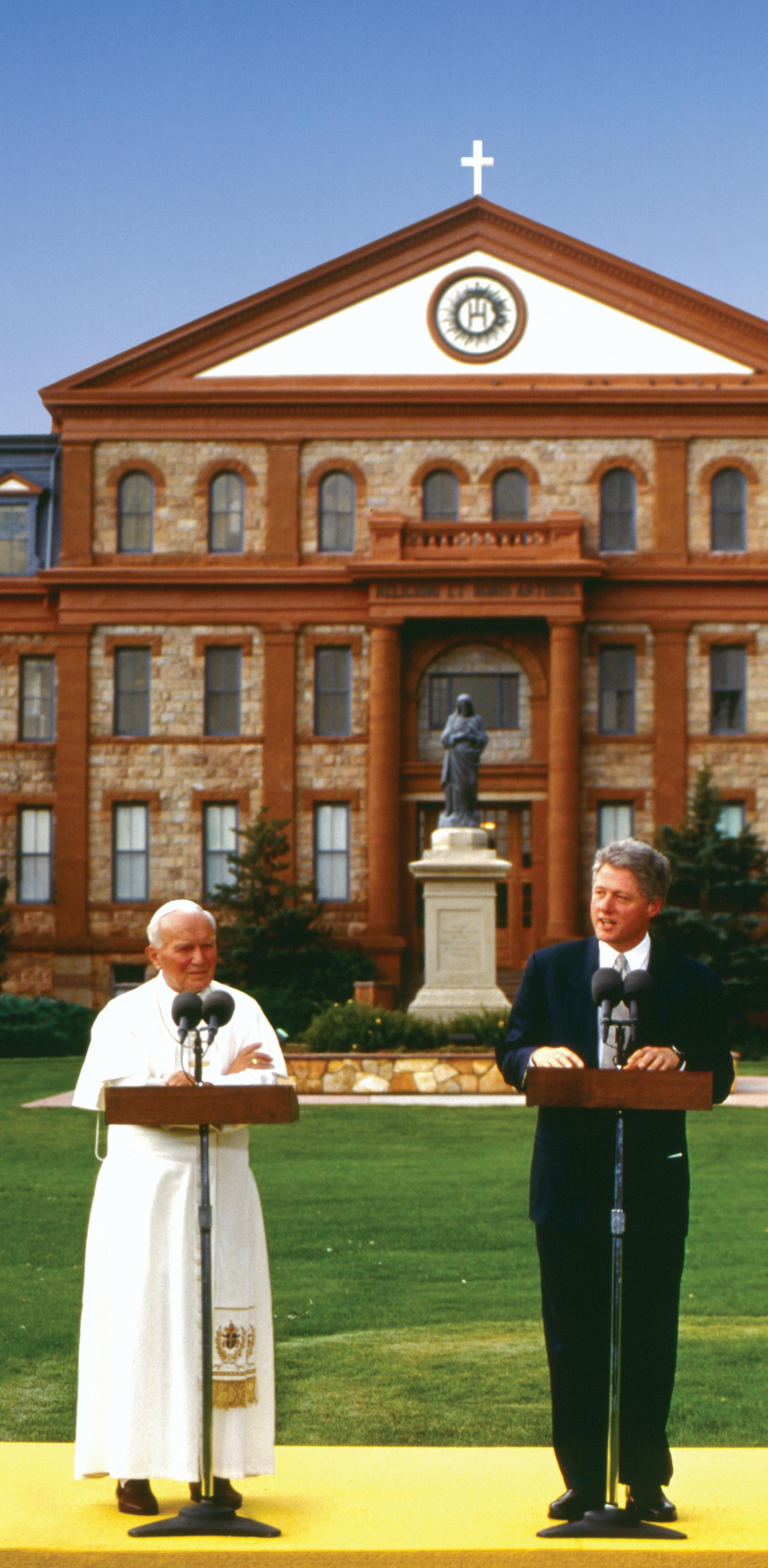
The pontiff had come to Denver to host the first World Youth Day, which drew an estimated 750,000 to Cherry Creek State Park. He also conducted a mass at Denver’s Cathedral Basilica of the Immaculate Conception and hiked in the foothills.
Some may notice Main Hall was missing its cupola when the dignitaries were here. The original 60,000-pound cupola was removed in 1949 due to lightning and wind damage and concerns its weight was straining the historic structure. The current 18,000-pound, 45-foot tall replacement was installed in 2006.
REGIS.EDU 11
Courtesy
Regis University Archives
REGIS UNIVERSITY APPOINTS FIRST LAY AND LATINO PRESIDENT IN SCHOOL HISTORY
Regis started the new year by making history: On January 1, Salvador Aceves, Ed.D., became the University’s first lay President, and the first of Latino heritage. Aceves brings 37 years’ experience in Jesuit Catholic higher education to the role.
Aceves was born and grew up in San Francisco, where he met his future wife in the fifth grade, and where he earned a bachelor’s degree in accounting from the University of San Francisco (USF). During a successful private-sector career in tax accounting, Aceves said he “developed a growing appreciation for helping clients interpret the law. This led to a love of teaching and a love for the accounting profession.”
That appreciation led him back to his hometown, where he earned a master’s degree in taxation at Golden Gate University and became a part-time faculty member at USF, where he earned an Ed.D. in education. In 2011, he joined the provost office at Fordham University, then in 2014, came to Regis as a senior vice president and the chief financial officer (CFO).
In his first months as President, Aceves has undertaken the creation of a strategic plan for the University, and has announced four priorities:
1. Invite families who already share a commitment to Jesuit Catholic education to support their children as they continue their education at Regis and reach out to community partners to support their employees through a Regis education.
2. Announce a significant gift every quarter.
3. Support the academic community as it reimagines traditional, post traditional, graduate, and doctoral education that is grounded in our Jesuit Catholic values, is market responsive and financially sustainable.
4. Develop a campus culture that empowers the community to make timely decisions addressing the needs of faculty, staff and students.
We spoke with Aceves to learn more about his experience and his vision for the future of Regis.

12 Spring /Summer 2023 | REGIS UNIVERSITY MAGAZINE
Photo: Brett Stakelin
Q: What attracted you to Regis?
At the University of San Francisco, I met Father [John] Fitzgibbons. He joined the university as a vice president and dean, during which time we developed a shared interest in planning and finances, and became friends.
We each later were presented with opportunities at other Jesuit institutions. He went to Marquette, and I went to Fordham, but we remained in touch.
Shortly after becoming President of Regis, he called and said, “My CFO just announced his retirement. Would you be interested in applying for the position?”
I came to campus and interviewed with his team and others. This created my pathway to Regis.
Q: You are the first Latino and the first lay person to serve as the University’s president. How do you view the significance of that?
I value the importance of our Jesuit Catholic identity and am honored to serve as Regis's first lay and first Latino president. The Jesuit Provincial has given me an incredibly important task to lead through our mission. I have been blessed by the wisdom of the Jesuits, who started developing lay leaders in the Jesuit Catholic intellectual tradition. This
has deepened my faith and has helped me become a servant-leader and a companion for our colleagues and students in their formative journey. As a Latino leader, I hope I can inspire fellow Latinos to see themselves in positions that have been historically underrepresented. I also hope I can welcome them into an inclusive community that values their gifts and talents.
Q: You are approaching your ninth anniversary at Regis. In that time, you’ve undoubtedly been able to observe all aspects of the University. What would you say are Regis’ greatest strengths?
Regis is strongest when it embraces a collaborative culture. Regis thrives when our community reflects its commitment to teamwork and mutual respect. We are indeed at our best when we are relational.
Q: What are areas where Regis could improve?
We need to recognize expertise across the institution and empower our colleagues to help us understand the root cause of specific issues and problems, and find and implement solutions.
We also need to embrace a mindset of continuous improvement. This approach will improve and strengthen
operations and allow us to support our transformative educational experience.
Q: You have said that a priority will be engaging employers in the community to support employees through a Regis education. Can you describe what you mean by that?
Engaging employers in the community to support employees through a Regis education can be a valuable opportunity to strengthen the relationship between the institution, its students, and the local business community.
By partnering with employers to offer educational benefits such as tuition reimbursement and flexible scheduling, Regis can enhance the career opportunities of its students and demonstrate its commitment to the professional development of a workforce. This can also benefit employers by providing them with skilled and knowledgeable employees. Overall, such partnerships can create a mutually supportive relationship for both Regis and local employers.
Q: Are you enjoying yourself as President?
Absolutely! It is a real privilege and blessing to serve in this role. –KA
REGIS.EDU 13
As a Latino leader, I hope I can inspire fellow Latinos to see themselves in positions that have been historically underrepresented. Salvador Aceves, Ed.D.
“ ”
SOUND AND COLOR
REGIS PROFESSOR
STUDIES WHETHER – AND HOW –NOISE CAN CALM

UNQUIET MINDS
BY SARA KNUTH
In video after video, TikTok users record themselves listening to a continuous ocean-like sound. Most look into the camera as they listen, grin, and reach the same conclusion: their mind is quiet. Distracting thoughts vanish. Focusing becomes easier. For some, it’s the first time they’ve ever been able to silence the constant noise in their minds.
Videos about brown noise, viewed more than 113 million times on the video-sharing app since last summer, kicked off a phenomenon for thousands of users who have come to swear by the sound for its calming effects and potential to ease ADHD symptoms.
But does brown noise really work? Since last fall, Dan Berlau, Regis professor of pharmaceutical sciences, has been asked that question by journalists from across the country. His answers have appeared in the Washington Post, the New York Times, The Guardian US, and even the beauty-product magazine Allure. Each time, his answer is: It’s complicated.
In 2018, Berlau and a student studied the effects of white noise, the older, more popular cousin of brown noise. They found convincing evidence that white noise can help ease symptoms of ADHD, including problems with impulsivity and focus. The results were published in the peer-reviewed journal Complementary Therapies in Medicine. But their research didn’t exactly hit the mainstream.

“No one mentioned it or talked to us about it at all,” Berlau said. “I thought it was interesting, but it just sort of didn't find an audience.”
Not until summer 2022, when brown noise went viral on TikTok. Brown noise, which sounds like the inside of an airplane, the ocean or wind, isn’t the only colorful sound that has caught the attention of the online masses. Other varieties include pink, gray and violet noise, which all vary in frequency — or how pleasant they sound to the human ear.
“Out of the blue, I started getting calls,” Berlau said. “If you Googled ‘brown noise ADHD,’ the only thing that came up is my paper about white noise and ADHD. And so, I guess we were lucky enough to be one of the people who sort of talked about this a while ago.”
Berlau said the viral TikToks have generated plenty of interest about the science of the different variations of noise. So, how does it work?
The science — and mystery — of noise
People who have ADHD have an imbalance in the way dopamine is released in their brains throughout the day, Berlau said.
In the same Washington Post article that featured Berlau, researcher Göran Söderland, of Western Norway University of Applied Sciences, explained that in some people with ADHD, neuron signals in the brain are like fireworks exploding in all directions causing a “noisy” head with chaotic thoughts competing for attention.
ADHD medications, Berlau said, allow brains to slowly release dopamine, mimicking the activity of neurotypical brains, which release small amounts of dopamine throughout the day. This steady drip allows people to focus and prevents hyperactivity.
“The thought is that brown noise — because it's a sort of blanket stimulating event — may be able to mimic in some way that tonic release of dopamine, the dopamine trickle,” Berlau said.
Not much research has been completed on brown noise specifically. In studies about white noise, however, researchers found that when people with ADHD listened to white noise, their dopamine levels didn’t change — “so it’s not making dopamine be released,” Berlau said. But, somehow, the noise mimics the stimulating effect that helps people focus.
“The best theory is that there's this general level of arousal that needs to take place in your brain to sort of have optimal functioning,” Berlau said. “And brown noise and white noise help people's brains get to that optimal level.”
At the time Berlau was studying noise, the most popular variations were white, brown and pink noise, though more varieties have since become popular. White, brown and pink noise are all known as broadband sounds because they
contain many frequencies that humans can hear. White noise includes all frequencies that humans can hear at the same level. Examples of white noise include electric fans, an air conditioner’s hum or radio static.
Pink noise, which includes nature sounds like waterfalls, wind or waves, is a softer version of white noise. It plays low frequencies louder than high frequencies.
Brown noise gets its name from Scottish botanist Robert Brown who discovered “Brownian motion,” — the way pollen grains seem to dance when suspended in motion. Some say brown noise mimics that random movement. Brown noise contains all frequencies but turns up the lower frequencies and softens the higher frequencies.
Human ears hear high-pitched noises louder than lowerpitched sounds. So even though white noise plays all the frequencies ears can hear at the same level, people hear the higher pitched noises the loudest, Berlau said. Pink and brown noise, on the other hand, turn down the volume on the higher pitched sounds to adjust for the way ears perceive sound, resulting in sounds that are more pleasant for some.
The benefits of distinct types of sound have become clear to many listeners over the past year. Berlau, like a growing number of people, said he uses pink noise to sleep because the masking effect of noise helps drown out other sounds. When his son was born, Berlau used a noise machine to help him sleep. It wasn’t long before the entire family became accustomed to the soothing sounds of pink noise. Some people use brown noise when they try to focus on a task in a coffee shop. Many use it in the workplace. And for people with ADHD, different types of noise may help treat symptoms, especially as a shortage of Adderall, an ADHD medication, has persisted.
“The neat thing about brown noise is that you can very quickly make it louder or softer, you can listen to it in one context or the other,” Berlau said. “You can try pink noise or some brown noise. And all of these interventions are safe and mostly free, as opposed to medications where you can't just switch things around like that.”
White noise emits all frequencies at the same level, resulting in noise that many people find pleasant, including electric fans or radio static.
Pink noise may sound more pleasant than white noise to some because it plays low frequencies louder than high frequencies, resulting in a waterfall-like sound.
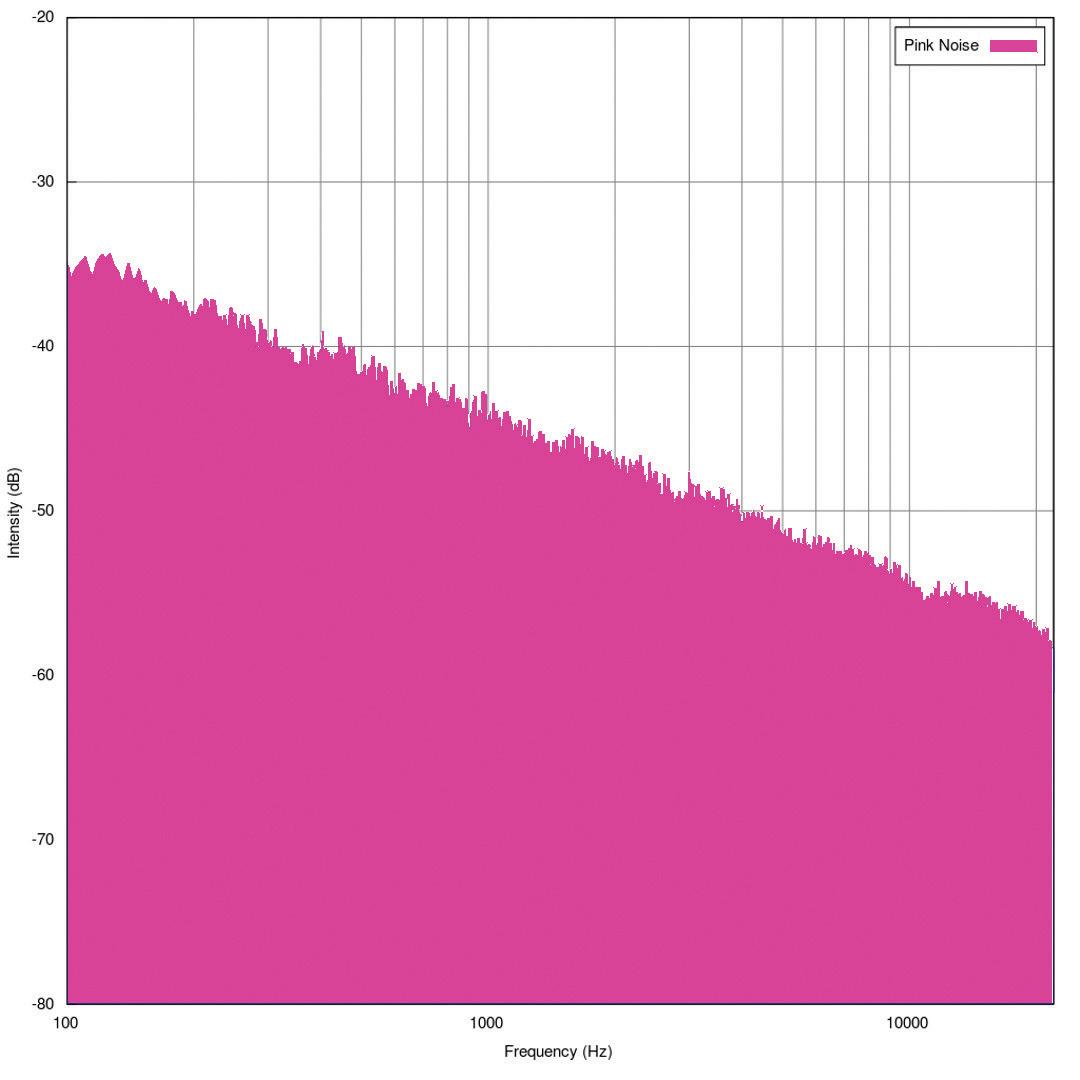
Brown noise turns up the lower frequencies and softens the higher frequencies. One theory is that brown noise's "blanket effect" quiets noisy brains by mimicking ADHD medications.

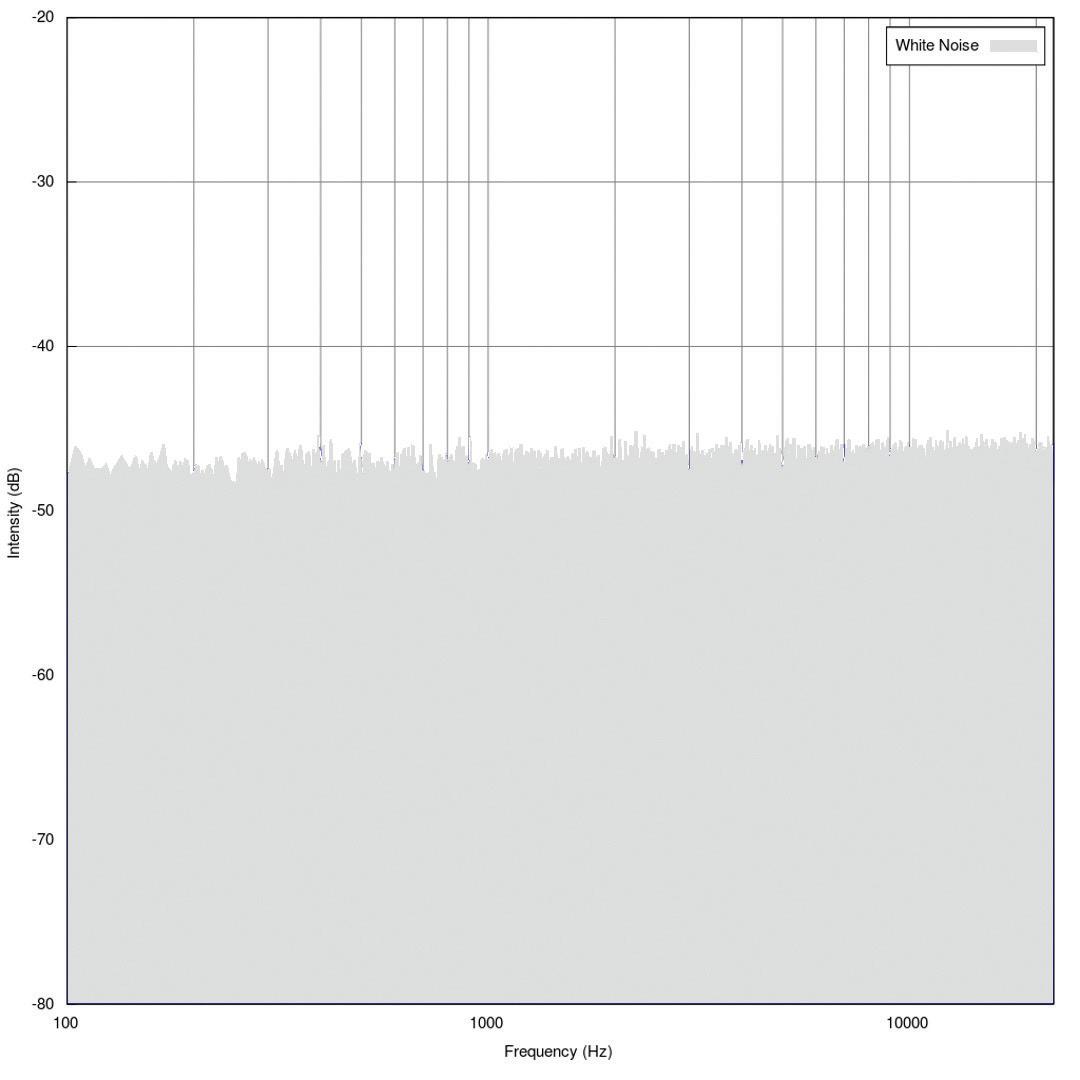
16 Spring /Summer 2023 | REGIS UNIVERSITY MAGAZINE
Graphics courtesy: Dan Berlau
Berlau said he does not advocate replacing traditional treatments and medications with brown noise. But he added that brown noise may be an effective supplement, as long as users listen to the noise at a safe volume. “The risks are pretty low, and the benefits are not that bad either,” he said.
Although Berlau and colleagues have found convincing evidence that white noise can ease ADHD symptoms, the science of brown noise remains understudied. He anticipates that the viral trend of brown noise will prompt more research.
Since 2011, Berlau has tackled research with students, including investigating the status of muscular dystrophy drugs in the United States and analyzing whether marijuana could be an effective substitute for opioids in pain management. When a student approached him about studying white noise in 2018, he agreed. Once their work is published, he lists the student as first author.
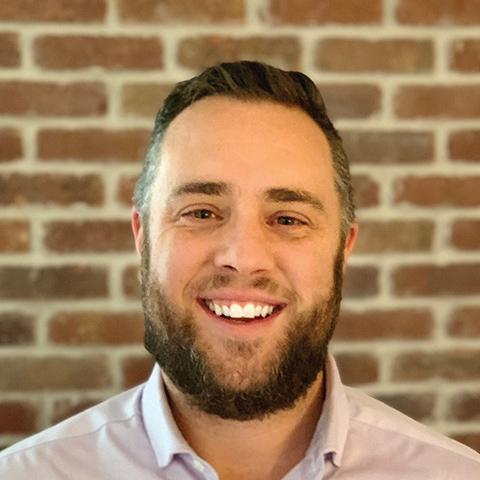
For Berlau, though, his next research projects will be guided by his students, continuing work that he began when he started at Regis. Berlau’s interest in white noise was prompted by a student who wanted to learn more.
Students as first author
Berlau, who earned his Ph.D. in neuroscience from the University of California Irvine, said that a friend approached him about a new pharmacy program starting at Regis in 2011. After completing his studies in neuroscience, he wasn’t necessarily thinking about teaching pharmacy. But then, he visited Regis.
“Once I came here, and saw our team-based learning, I was sold,” Berlau said. “I saw a team-based learning class and I was like, 100 percent, this is what I want to do for my career. And I don't regret that for a second.”
While brown noise went viral on TikTok and dominated a news cycle during the fall, Berlau and his students have worked on other frequently cited projects. In 2018, he published a paper about how statins — medications for high cholesterol — may impact dementia. A small percentage of people who take statins experience delirium, or temporary dementia, until they stop taking the medication, Berlau said. For other people, though, statins decrease the likelihood that they will develop dementia. The paper explored how both effects could be possible. Since the research was published, the paper has been widely cited by other researchers.
Until the next TikTok trend, Berlau plans to keep assisting students with research, giving them a chance to contribute to the field.
“Since I've come to Regis, what I have really focused on is engaging students in writing papers and doing research on topics that they're interested in and contributing to the literature in some meaningful way.”
REGIS.EDU 17
"You can try pink noise or some brown noise. And all of these interventions are safe and mostly free, as opposed to medications where you can't just switch things around like that." –Prof. Dan Berlau
FROM SLAVE TO SAINT

REGIS LEADER GUIDES EFFORT TO CANONIZE DENVER WOMAN
BY SHERYL TIROL PHOTOS BY BARRY "BEAR" GUTIERREZ
As part of the investigation for canonization, Julia Greeley’s body was disinterred. Her remains are now in the Cathedral Basilica of the Immaculate Conception in downtown Denver. Greeley is the only person interred in the cathedral.
On Lowell Boulevard in northwest Denver, a beautiful Victorian home sits just across the street from the Regis campus. Inside that house, more than a century ago, a tiny and frail former slave swept the floors, made the beds and tidied the rooms. Blinded in one eye by a slave owner’s whip and hobbled by arthritis, she then would have walked to a boardinghouse downtown where she lived, and might have crossed the campus of what then was known as Sacred Heart College to shorten the journey.
That woman, Julia Greeley, born a slave in Missouri between 1833 and 1848, is now a candidate for Catholic sainthood.


As an emancipated adult, Greeley worked for the sister of Julia Pratte Gilpin, who later became wife of Colorado’s first territorial governor. It was that association that brought Julia Greeley to Colorado in 1878, where she would earn a meager living cooking and cleaning homes. She became a devout Catholic who worshipped with the Jesuits, and began the life of charitable acts that would make her beloved during her lifetime and a candidate for Catholic sainthood.
Although she had very little herself – and occasionally even needed help from local charities – Greeley devoted much of her life to helping those in need. She tirelessly walked across Denver, often pulling a wagon behind her, collecting whatever she could for needy families.
In his biography of Greeley, In Service of the Sacred Heart: The Life and Virtues of Julia Greeley, Rev. Blaine Burkey, O.F.M. Cap., writes, “On one occasion, a priest of the Sacred Heart parish found her pushing a baby carriage along at night. She
had found a poor family that needed it. So, she had gone out and begged for it. On another occasion, one of the Jesuits met her carrying a broken doll…she told him that she was taking it home to fix up…to give it to some child.”
When she died in 1918, her ceaseless efforts to aid the poor had made Greeley so well-known in Denver that an estimated 1,000 mourners came to Loyola Chapel where her body lay to pay their respects.
“She was a woman with a wide-winged spirit,” wrote Frances Wayne, a Denver Post reporter who covered Greeley’s funeral. As recounted on the website of Denver’s Julia Greeley Home, which assists women facing homelessness, Wayne wrote that her legacy included “eighty-five years of worthy living… unselfish devotion…and a habit of giving and sharing herself and her goods.”
In 2016 the Vatican granted permission to open a cause for Greeley’s sainthood, naming her a Servant of God, the title granted to those under consideration for canonization. In December of that year, Rev. Samuel J. Aquila, archbishop of the Catholic Diocese of Denver, officially opened Greeley’s case for canonization.
The Denver Archdiocese assembled a committee to begin the research that would ultimately comprise the case for Greeley’s sainthood. David Uebbing, chancellor of the Archdiocese, was chosen to serve as vice postulator for the committee. The postulator is responsible for promoting the proposed saint’s cause locally, and the person responsible for communicating with the Vatican as the cause moves ahead.
“I was definitely honored to be asked to serve as the vice postulator. I never imagined I would do that in my entire life. It's my favorite thing I've done as chancellor. It's just so edifying to be close to the process of looking at a person's life and seeing how they've impacted so many people,” Uebbing said.
Barbara Wilcots, Ph.D., vice president of student affairs at Regis, who also was part of the committee, described it as a fascinating experience and said Greeley demonstrated values as a Catholic that are relatable to the average person. “Many of the saints seem like superheroes but Julia felt real and accessible. As a Black Catholic woman, I felt a true connection to a rich history that for too long was rendered invisible,” Wilcots said.
REGIS.EDU 19
The Archdiocese of Denver commissioned a painting based on the only known photo of Julia Greeley (left). The painting is on an altar in Denver's Sacred Heart Catholic Church. Courtesy: Archdiocese of Denver
Currently there are no Black saints from the United States. Although there are an estimated three million Black Catholics in the U.S., they comprise just four percent of the church population, and represent only six percent of the nation's Black adults. Still, many faithful believe recognition is long overdue for those Black people who led selfless lives of faith in this country.
Greeley is one of six Black Catholics from the United States being considered for sainthood. In December 2021, a group of activists from St. Ann’s Catholic Church in Baltimore sent 1,500 letters asking Pope Francis to “immediately” canonize those six. In addition to Greeley, those candidates are Henriette DeLille, who founded the Sisters of the Holy Family; Mary Elizabeth Lange, who founded the Oblate Sisters of Providence, the country’s first religious congregation of women of African descent; Pierre Toussaint, a former slave who helped raise money for St. Patrick’s Cathedral in New York but was not permitted to attend the cathedral’s opening because of his race; John Augustine Tolton, the first openly Black ordained priest; and Thea Bowman, a 20th century Franciscan sister, educator and evangelist.
University of Notre Dame history Prof. Kathleen Sprows Cummings told CNN that the canonization process generally takes decades, and that one roadblock to naming Black
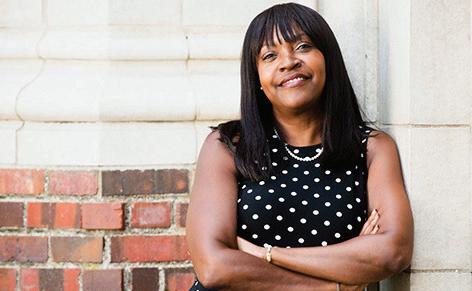
Greeley had lived and had been enslaved. Knight said they worked to document Greeley’s existence and turn over every stone to look for information about her early life.
While the process was long, Knight said he felt honored to be a part of it and admires her commitment to her faith. “I would say just how just how powerful Eucharistic devotion really is there's just no way to explain it. There was something about her works of mercy that truly were works of mercy because she was so centered,” Knight said.
The committee did have the aid of a small group of faithful men and women working on Greeley’s behalf. Since 2011 the volunteers of The Julia Greeley Guild have been dedicated “to extending Julia’s fame for sanctity, proposing her as a model of Christian virtue, encouraging private devotion to her, and helping cover some of the expenses of her Cause for Canonization,” according to their website. In addition, the group also raises money to help with the expenses of pursuing her cause.
Mary Leisring, president and executive director of the guild, believes Greeley was chosen by God to do charitable work despite the challenges she faced, and believes Greeley’s entire life is a model.
“She stands out as a person, that I would like to imitate…I try to think of Julia and what would Julia do in a case like this? She
saints can be the cost of the process, which often involves gathering voluminous documents, and, as in the case of Julia Greeley, travel.
Building the case for Greeley was a challenge. As was the case with many enslaved people, she never learned to read or write, so the committee did not have any of her writings to rely on.
Uebbing and another member of the Greeley canonization committee, Kevin Knight, traveled to Hannibal, Mo., where
walked the streets of Denver…and she never wavered as to who to give things to or who to share things with,” Leisring said.
The committee also had church records to help them. On June 26, 1880, Greeley was conditionally baptized at Denver’s Sacred Heart Catholic Church by Rev. Charles M. Ferrari, S.J., who recorded the event in a handwritten sacramental record that can still be viewed at the church. Since they did not know whether Greeley had been baptized before, they performed what is known as a conditional baptism.
20 Spring /Summer 2023 | REGIS UNIVERSITY MAGAZINE
"Many of the saints seem like superheroes but Julia felt real and accessible. As a Black Catholic woman, I felt a true connection to a rich history that for too long was rendered invisible."
Barbara Wilcots, Ph.D.
Photo: Brett Stakelin
Rev. Eric David Zegeer, current pastor at Sacred Heart, in what is now known as Denver’s Five Points neighborhood, said no one really knows how Greeley first came to that church. “For reasons I'm not aware of…she saw this church and came in to pray...and I think it's not implausible to suspect that had she entered other Catholic churches in Denver or other Christian churches, she may not have been welcomed, simply because she was a free Black [former] slave woman. But the Jesuits at that time, I think heroically, welcomed her.”
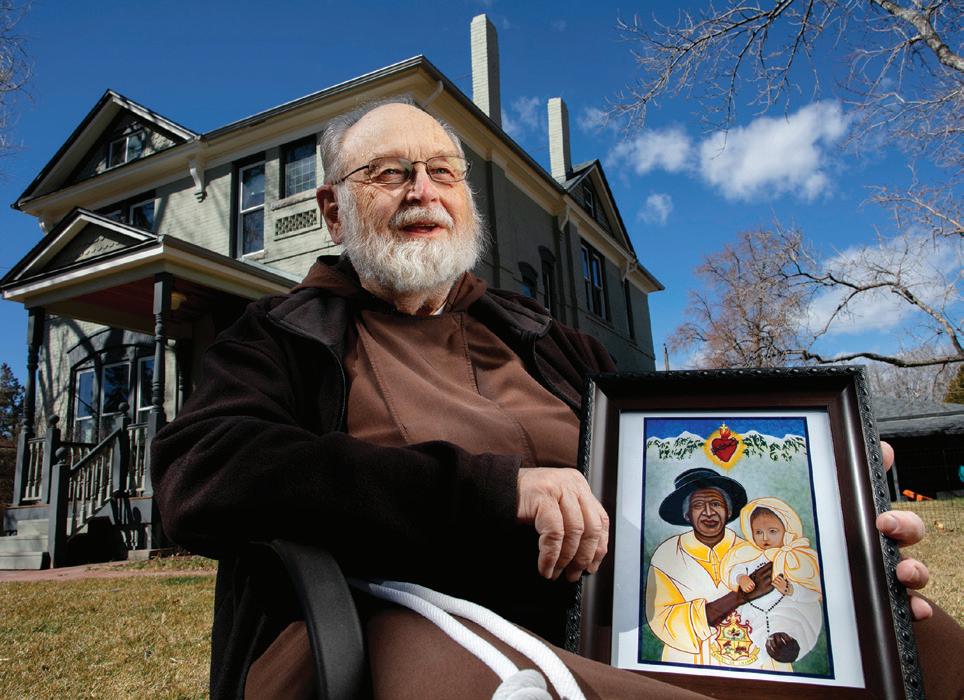
her.” Yet, according to Burkey, Greeley was so poor herself that “the city charity department had been furnishing her with fuel and groceries.”
Greeley had a special concern for firefighters, whom she felt were risking their lives almost daily to protect Denver residents, at a time when wooden homes and other buildings caught fire regularly. She was known to walk to fire stations across town praying for firefighters and handing out prayer leaflets. It was estimated she walked 20 miles each month to firehouses despite suffering from severe arthritis.
Not all members of the church welcomed her, but according to various reports, the church pastors vigorously defended her right to worship alongside white parishioners.
Greeley reportedly went to church daily, and from there drew inspiration for what became her life of selfless charity. In 2012, the Julia Greeley Guild published In Service of the Sacred Heart: The Life and Virtues of Julia Greeley by Rev. Blaine Burkey, O.F.M. Cap. The book includes testimonials, newspaper articles and other information about Greeley.
In Burkey’s book, he notes, “Her charity was so great that only God knows its extent. She was constantly visiting the poor and giving them assistance from her own slender means. When she found their needs so great that she could not help them with her own goods, she begged for them. Her charity was as delicate as it was great.
“She realized that white people, no matter how poor, might feel a little sensitive in receiving assistance from an old colored woman, so she went at night to their homes to deliver the goods she had begged, in order to keep the neighbors from seeing
Greeley had a particular devotion to the Sacred Heart of Jesus, one of the most widely practiced of Catholic devotions, and died on June 7, 1918, the feast day for the Sacred Heart. In 2017, her body was exhumed from its grave at Mt. Olivet Catholic Cemetery in Wheat Ridge, Colo., by a team led by Christine Pink, Ph.D., of Denver’s Metropolitan State University. According to the Julia Greeley Guild website, the exhumation revealed that Greeley had an extra rib. Pink determined Julia’s height to have been five feet, one inch, and said that her spine, legs, and hands were covered with arthritis.
Greeley’s remains now lie in a marble coffin at the Cathedral Basilica of the Immaculate Conception in downtown Denver, and the Vatican now has 36 volumes of documents, totaling 11,750 pages, detailing Greeley’s life and deeds, to review as they determine whether she is deserving of sainthood.
Those who are devoted to Greeley’s cause wait, and continue to work on her behalf. Whatever the Vatican decides, Leisring said Greeley’s life and works inspire her. Her goal, Leisring said, “is to try to make a difference in this world, even though you have all of these obstacles. Trying to eradicate racism and trying to help people understand that racism is a sin. And that we're all created by God.”
REGIS.EDU 21
"Her charity was so great that only God knows it's extent. She was constantly visiting the poor and giving them assistance from her own slender means."
Rev. Blaine Burkey, O.F.M. Cap.

ON A MISSION
How the Regis community is living Magis by helping asylum seekers from Venezuela
BY SARA KNUTH ILLUSTRATION BY SARAH FOLEY
As they prepared to leave Venezuela for the United States last September, Angelo Nunez-Pulgar’s parents told him he would have to be very brave. They told the 10-year-old that there would be no electronic games for a while. They told him they were going on a long camping trip.
Technically, that was true. For four months, as the family walked through multiple countries, they would often be sleeping outside, on the ground, in the cold. Despite the hardships they knew lay ahead, Angelo’s parents Meilyn Pulgar Rivero and Alexander David Caridad Nuñez headed to the United States to escape turmoil and food shortages in their own country, and to provide Angelo a safer home and a better education.
The family narrowly avoided death every day as they traversed notorious jungles between Colombia and Panama, stayed alert for kidnappings and nearly froze riding a freight train through Mexico. They also encountered kindness from church groups in Mexico and from people in Costa Rica who offered money — each an act that sustained them through the treacherous trip.

After they made it to El Paso, Texas, Meilyn and Alexander worked odd jobs there just long enough to buy bus tickets to Denver. They did not know what awaited them in the Mile High City.
What they found was good fortune at Regis University.
Within hours of receiving a call from Denver Mayor Michael Hancock last January, Regis President Salvador Aceves, Ed.D., had mobilized the campus community. The result was a temporary shelter on the Northwest Denver Campus, dubbed the Regis Welcome Center.
So, when the Nuñez-Pulgar family — and nearly 50 other families, all of whom had made the same long journey from Venezuela — arrived at Regis’ Northwest Denver Campus, they found cots, blankets, a warm place to sleep and the help of faculty, staff and students, along with Spanish-speakers who could translate for them. They also found heartfelt encouragement from one Regis staff member.
Twenty three years ago, Ludy Yevara immigrated to the United States from Venezuela. Now project management director in Regis’ marketing and communications department, Yevara made sure she was at the Welcome Center when the families arrived.
“I wanted to be the first face that they saw… also because for me, it was very emotional. It was fulfilling because they are people from Venezuela,” she said.
As she greeted them that first day, she told them, in Spanish, “You're okay, you're safe, you're welcome. Just relax during the time that you're here.”
Inside the Welcome Center families slept sideby-side on the cots, using blankets and pillows donated to the shelter just hours before by community members. After just a few days, the donations of clothes and blankets piled so high that Regis began offering them to other shelters temporarily housing families in the city.
The donation room was also lined with tables of food for the families, from oatmeal to fruit and vegetables. To keep warm in the January weather, families bundled up in donated coats and sweatshirts. In each room, toys, coloring books and games were strewn about, keeping
children busy as their parents went about the about the hard work of establishing new lives. The parents also met with an immigration attorney – the spouse of a Regis faculty member who donated her time – and Denver officials.

While federal immigration policy is in almost constant flux, the Department of Homeland Security has granted Temporary Protected Status (TPS) to asylum seekers from Venezuela through March 10, 2024. Under TPS, Venezuelans who qualify cannot be deported or detained and may be able to obtain employment authorization.
For a week, the families rested at the Welcome Center and stocked up on donated supplies, before some left for destinations across the United States and Canada. The Nuñez-Pulgar family, however, felt welcome in Denver, and began working to make a new life and home here.
FOR REGIS STAFF MEMBER LUDY YEVARA, HELPING VENEZUELAN MIGRANTS WAS PERSONAL
As a bus filled with families leaving the Welcome Center prepared to depart, Ludy Yevara stood in front of the temporary shelter, waving to guests and wishing them well. She had been working with the families all week, helping them connect with resources, including housing and transportation to new destinations. Though she had only known them for a week, the families were close to her heart. Yevara had helped Venezuelan families even before the Welcome Center opened at Regis, volunteering at temporary shelters set up for asylum seekers across Denver.
Between December 2022 and the end of February, more than 5,000 migrants, many from Venezuela, arrived in Denver, according to city data. The week Regis housed Venezuelan families, the city counted 1,848 migrants. Thousands more have arrived in the city since.
City officials have said there may be several reasons why so many have come to Denver, including connections between aid agencies in El Paso and Denver. In December, Evan Dreyer, Mayor Hancock’s
24 Spring /Summer 2023 | REGIS UNIVERSITY MAGAZINE
The Regis Welcome Center gave families a safe, warm place to rest after the long journey from Venezuela. Photo: Skip Stewart
deputy chief of staff, told reporters there is no evidence of “anything that was organized by another government entity to direct people specifically to Denver.” He said some of those staying at a cityrun emergency shelter told workers they organized on social media to come to Denver.
Regardless of whatever brought them to Denver, the families were part of a massive wave of people who have fled Venezuela in the past several years. Venezuela, which sits atop the richest oil reserves
“This is something that we do because we want to do more, because this is Magis,” Yevara said.
STUDENTS PUT THEIR JESUIT EDUCATION INTO ACTION
When Regis opened its doors to asylum seekers, freshman Metzy Morales Jurado didn’t hesitate to help. Morales Jurado, who is fluent in Spanish, knew she could put her translation skills to use.
It didn’t take long for her role to evolve. On her first day at the welcome center, Morales Jurado translated for a family whose 1-year-old boy had been battling pneumonia since he and his family arrived in Mexico. “It was heartbreaking because he was so little,” Morales Jurado said.
Morales Jurado accompanied the family to Children’s Hospital Colorado, where she bridged the language gap between the child’s parents and his doctors. Doctors prescribed antibiotics and sent the boy back with his parents to the shelter to recover.

Morales Jurado, a neuroscience major at Regis, plans to become a pediatric neurologist, treating children who have nervous system conditions. Helping at the shelter reinforced her desire to care for children. Morales Jurado has received the Magis and First Scholars scholarships, administered by Regis, as well as three external scholarships.
in the world, once was one of South America’s wealthiest nations. However, corruption, the country’s increasingly authoritarian government and other factors have ignited the violence and turmoil that has brought the country to the brink of social and economic collapse. As a result, millions have become refugees in neighboring South American countries and in the United States.
Yevara said she views helping families as an extension of Regis’ Jesuit values and that she was proud of the way the University community pulled resources together quickly to help. But she knew the assistance work was far from complete. The path ahead will be a long one, Yevara said, as families prepare to integrate into American society.
As she waved goodbye to the people on the bus in January, she resolved to stay in touch with the families. She did, and kept updated on their victories and setbacks, all the while offering them the same support and messages of welcome.
“I like to help people and just knowing that I couldn't do anything for him at the moment was hard,” Morales Jurado said. “But then knowing that there were other medical professionals out there who have the capabilities of helping, and seeing that care that he was given, really just reinforced my idea of wanting to go into pediatrics and helping future children.”
When Morales Jurado enrolled at Regis, she sought out groups that highlight Latino heritage, including SOMOS Regis — or
REGIS.EDU 25
“ ”
"This is something that we do because we want to do more, because this is Magis." —Ludy Yevara
Regis staff member Ludy Yevara kept in touch with the Nuñez-Pulgar family, even joining them for a game of Monopoly at their new apartment. Photo: Barry "Bear" Gutierrez
We Are Regis — which celebrates Latino culture and supports Latino students. Morales Jurado learned about the volunteering opportunity through SOMOS Regis.
Morales Jurado, whose parents came to the United States from Mexico, said she knows firsthand the struggles that many families face when they leave their home countries. The experience helping the families will stay with her, she said.
“Regardless of the situation that they were going through, you would always see them with a smile on their face,” Morales Jurado said. “And that honestly was such a beautiful thing to see.”
Since families began arriving in the United States, other Regis students have answered the call to help.
For Regis junior Eric Novelo, a neuroscience and philosophy double major who volunteered at the shelter, it felt important to document the stories of the Regis guests. As he visited the shelter, he recorded interviews with families. He wanted their stories heard beyond the walls of the Regis Welcome Center.
“People are currently migrating through multiple countries because of economic instability,” he said. “And that that is not something that we should be ignorant about. But also, it’s something that we could so easily be experiencing, as well.”
For Novelo, capturing interviews on video means preserving stories that may change perspectives.
Regis educators have made helping the families a priority both inside and outside the classroom. Jason Taylor, director of First Year Experience at Regis, said three students enrolled in the University’s En/Route
program have assisted families with translation at the West Colfax Lampstand, a housing nonprofit where some Venezuelan families have been staying.
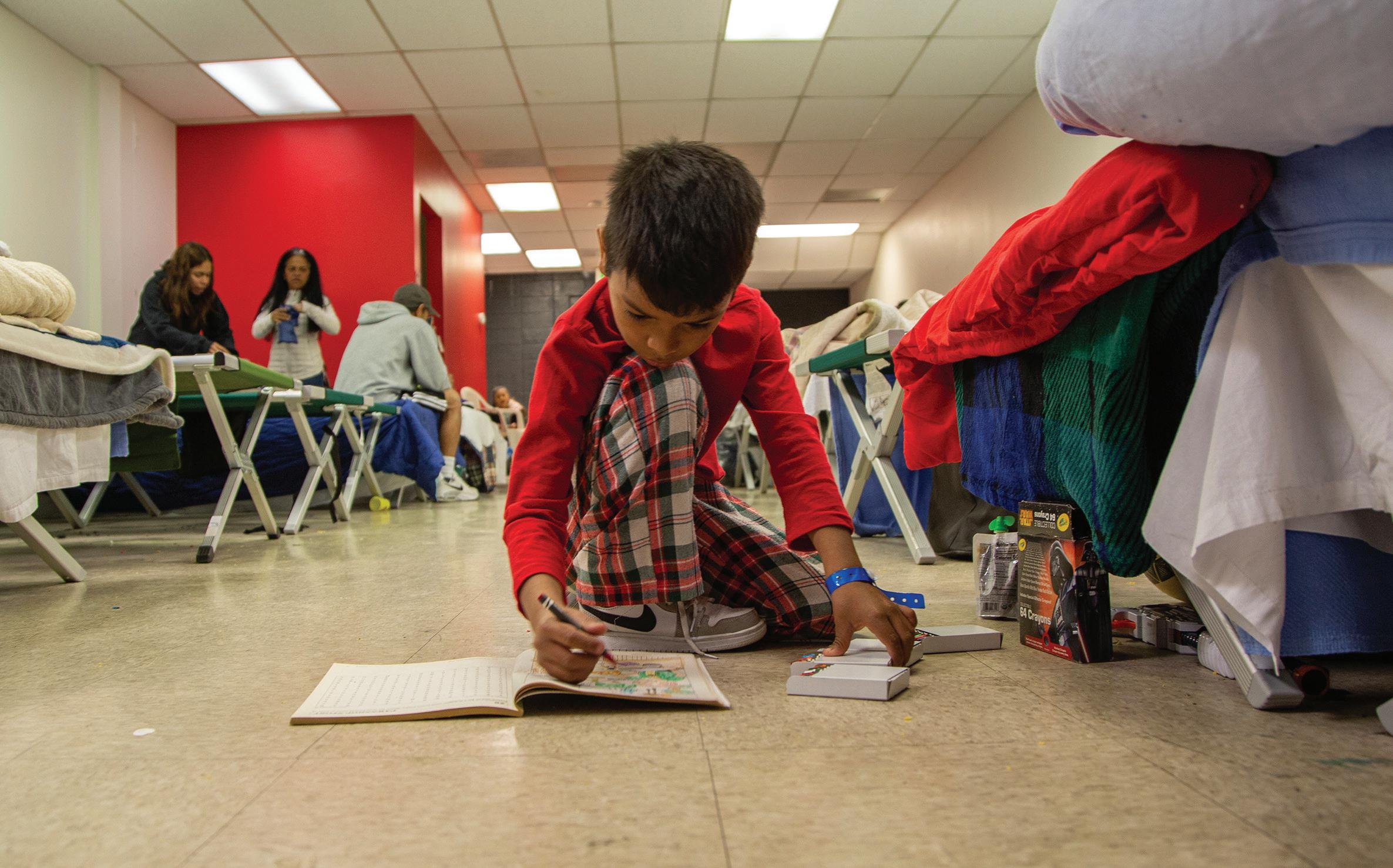
Taylor, who helped at the shelter, said the efforts have allowed students to make a difference in an immediate way. En/Route, an optional class that has been available to first-year students for a decade, sends students into nonprofits to assist. Students take their experiences back to the classroom to reflect on them.
“It's a really interesting experience because they're being super helpful in very tangible and immediate ways, which feels good,” Taylor said. “It's a learning space for students and ideally what the students are doing is bringing that experience back into the classroom.”
ALUMNI CREATE HOMES FOR LOCAL AND DISPLACED FAMILIES
When Regis alumni Chad and Shantelle Mulliniks tore down their former home in Denver’s West Colfax neighborhood more than a year ago, they replaced it with a 20-unit apartment complex. Their goal: Offer affordable housing to low-income families in the community, specifically those with children, who have been displaced by skyrocketing housing costs.
Nearly 10 years before opening the apartment complex, the couple had moved out of their former home and built townhomes they envisioned would become a community that highlights Christian
26 Spring /Summer 2023 | REGIS UNIVERSITY MAGAZINE
For many of the children who stayed there, the Regis Welcome Center provided the first opportunity in weeks to relax, play or read.
Photo: Skip Stewart
values. As families moved into the townhomes, they saw the need for more affordable housing in their neighborhood. Working with neighborhood schools and local organizations, their nonprofit, West Colfax Lampstand, built relationships to help families get into stable housing via the new apartments. Soon, West Colfax families began calling the Lampstand apartment complex home.
“We have a family focus, specifically trying to get elementary-age kids into the local schools,” Shantelle Mulliniks said.
Over the next year, the apartment complex opened its doors to another population in need: refugees and asylum seekers. In addition to serving families from the community, the couple worked closely with the African Community Center in Denver to welcome refugees from Afghanistan who fled the country after the war ended in 2021. The complex housed three Afghan families as they searched for jobs and enrolled their children in school.
“We got to experience that program of onboarding some refugees into the community,” Shantelle Mulliniks said. That meant “getting them help with doing job applications, IDs, getting kids in school.” After staying at Lampstand, each family moved into permanent housing.
Soon, the couple, who both graduated from Regis in 2003, wanted to help the flood of people coming to Denver from Venezuela. They contacted a friend, Regis College Academic Program Coordinator Quinn Waller. The Lampstand opened its doors to a total of five Venezuelan families, including two who previously stayed at Regis.
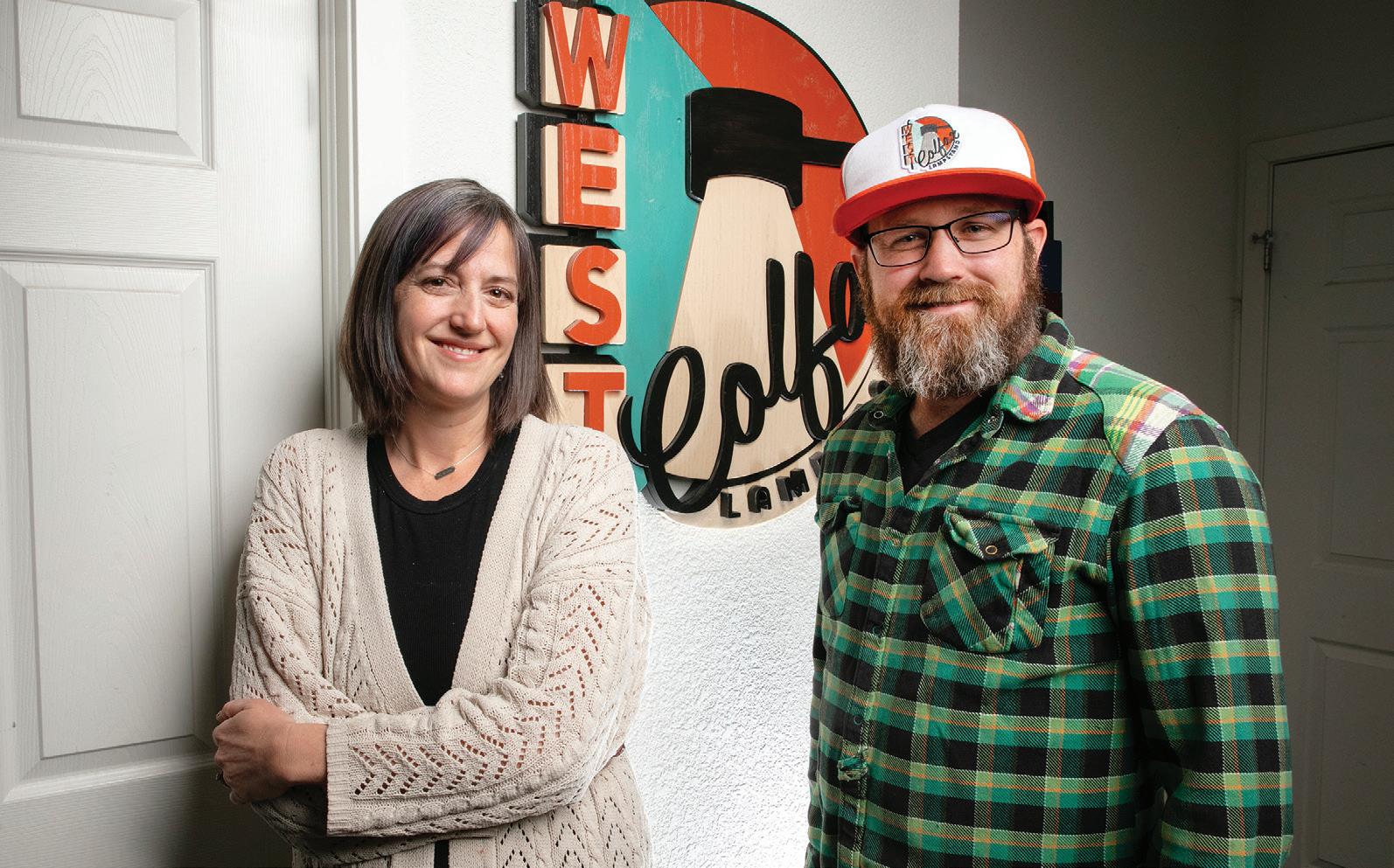
Helping the families makes the crisis that brought them here feel close to home, Shantelle Mulliniks said. “I think it makes us better as humans,” she said. “This isn't an issue happening at the border, happening somewhere else. It’s not a political thing. It's our neighbors, who we know, and we see their kids, and we walk up to school together.”
The couple quickly learned that each population has different needs. Unlike refugees from Afghanistan, who arrived at the Lampstand via national programs and who each received six months of free housing, the asylum seekers from Venezuela got no such support. Shantelle Mulliniks said the nonprofit is providing three free months of housing to the families and is seeking donations to provide an additional three months.
“The goal is to give them a period of time to stabilize and be able to get jobs,” she said. “The other part is connecting to wraparound services. So, making sure they're connected to all the things that they need,” including immigration legal services, doctor’s appointments, transportation and school.
For all the populations the Lampstand serves, the need for housing remains as pressing as ever. As of this spring, the Lampstand was at capacity. The couple said they could use support in the form of donations to the Housing Assistance Fund to give an additional three months of housing to the families and volunteers who may be able to assist with transportation to appointments.
For Chad and Shantelle, helping families in need reflects values prominent during their time at Regis. The family remains connected with other Regis alumni who live the Jesuit mission.
“It’s really cool to think that there's the central thing that binds us, and we see…Regis as a place where there is value being created,” Chad Mulliniks said. “Some of the most important people and relationships that we built came out of Regis and continue to be relationships that we have.”
MAKING A HOME IN A NEW COUNTRY
In February, just two months after crossing into the United States, the Nuñez-Pulgar family
REGIS.EDU 27
"This isn't an issue happening at the border, happening somewhere else. It’s not a political thing. It's our neighbors."
“ ”
—Shantelle Mulliniks
Regis alumni Shantelle and Chad Mulliniks believe helping families "makes us better as humans." Photo: Barry "Bear" Gutierrez
was settling into a space at the West Colfax Lampstand. With the help of translators, the family soon began the work of building a new life in Denver.
For months, the Nuñez-Pulgar family’s goal was simply to get to the United States. Then, they thought they might keep moving throughout the country. But after they had a chance to catch their breath in Denver, they found themselves surrounded by a community so welcoming that they decided to stay. In January, the family had a new goal: to get into a warm, safe house and make sure their son was safe.
By February, they had achieved that and more. They had a safe place to stay. Alexander found a job in construction. Meilyn volunteered in the community. They enrolled Angelo in the fourth grade, where he soon began making friends. His class is 50 percent Spanish-speaking and 50 percent Englishspeaking. Before he started school, Angelo met another Venezuelan boy in his class and had a chance to meet his other classmates.
His love of electronics continues: Angelo’s goal is to one day work with computers, and he already has his sights set on a university — Regis.

“The beginning was very hard because of the situation. We didn't have a job,” Meilyn said as Yevara translated. “But we were always grateful because we have a house and also food.” Things got even better once they moved into the Lampstand.
“And thanks to Chad and Shantelle,” Meilyn said. “We are very grateful because we don't need anything at this point.”
The family still has a long path ahead as they seek stability. But the past few months have
been a chance to find peace. Meilyn still often thinks about family she left behind in Venezuela, as well as the people she met on her travels to the United States. In Venezeula, Meilyn worked as a dental assistant; now her goal is to become a dentist, and to offer the same support her family received.
“When I'm able to have a job, I (would) like to support my family,” she said. “I met so many people in my path…I know that these people need help. So, somehow, I need to find a way to help them.”
28 Spring /Summer 2023 | REGIS UNIVERSITY MAGAZINE
Creating a better life for their son, Angelo, is a big part of what drove the Nuñez-Pulgar family to leave Venezuela for the United States.
Photo: Barry "Bear" Gutierrez
THEIR FUTURE.
REGIS UNIVERSITY YOUR LEGACY.
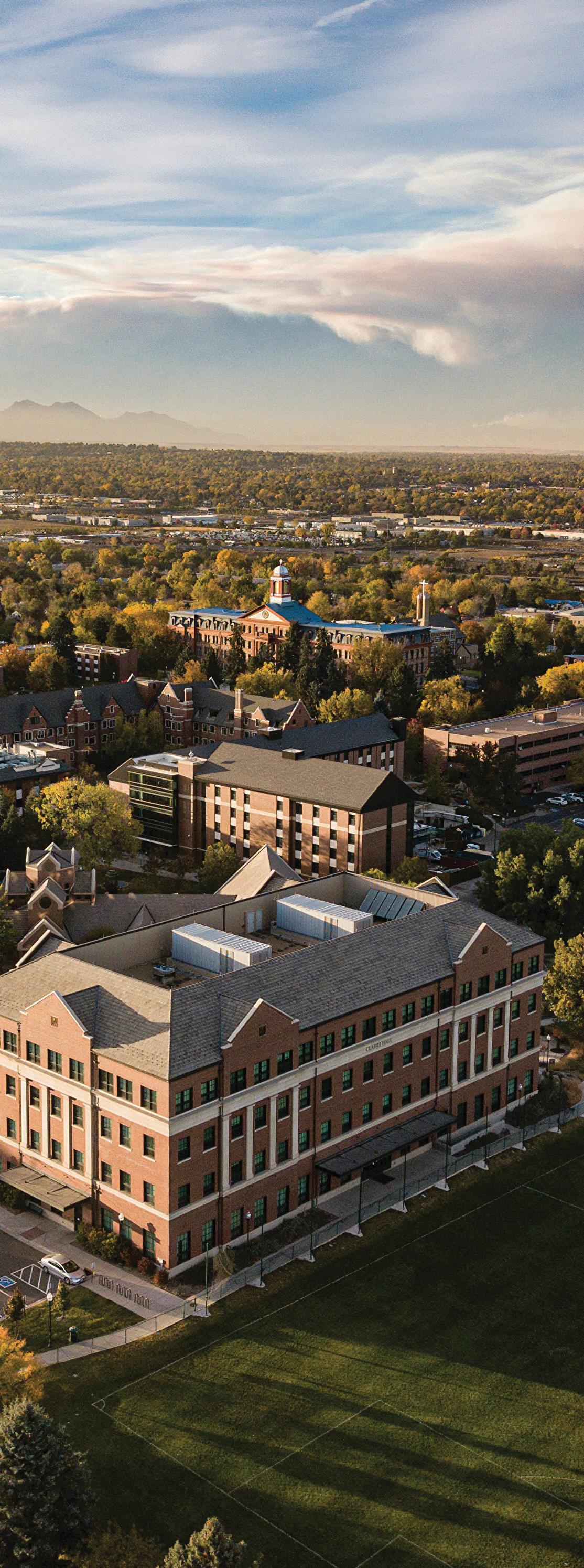
IGNITE
Sept. 21-24, 2023
This fall, reconnect and celebrate a homecoming of Regis students, alumni, families and friends.
To learn more, visit regis.mylegacygift.org.

REGIS.EDU 29
Learn More and Register: regis.edu/blueandgold A TRADITION
It's never too early to make an impact.
When you include Regis University in your estate plan, you connect future generations to a transformative education that turns learners into leaders.
WOMEN'S BASKETBALL POSTS STUNNING SEASON

THE TEAM NOBODY EXPECTED TO GO ANYWHERE NEARLY WENT THE DISTANCE
The Rangers women’s basketball team, which prognosticators picked to finish seventh in their conference, posted a 25-6 overall record. They finished not in seventh, but atop the Rocky Mountain Athletic Conference for the first time in 16 years. Then they walked away with the conference’s tournament championship, and earned a three-seed in the NCAA Division II National Women's Basketball Tournament.
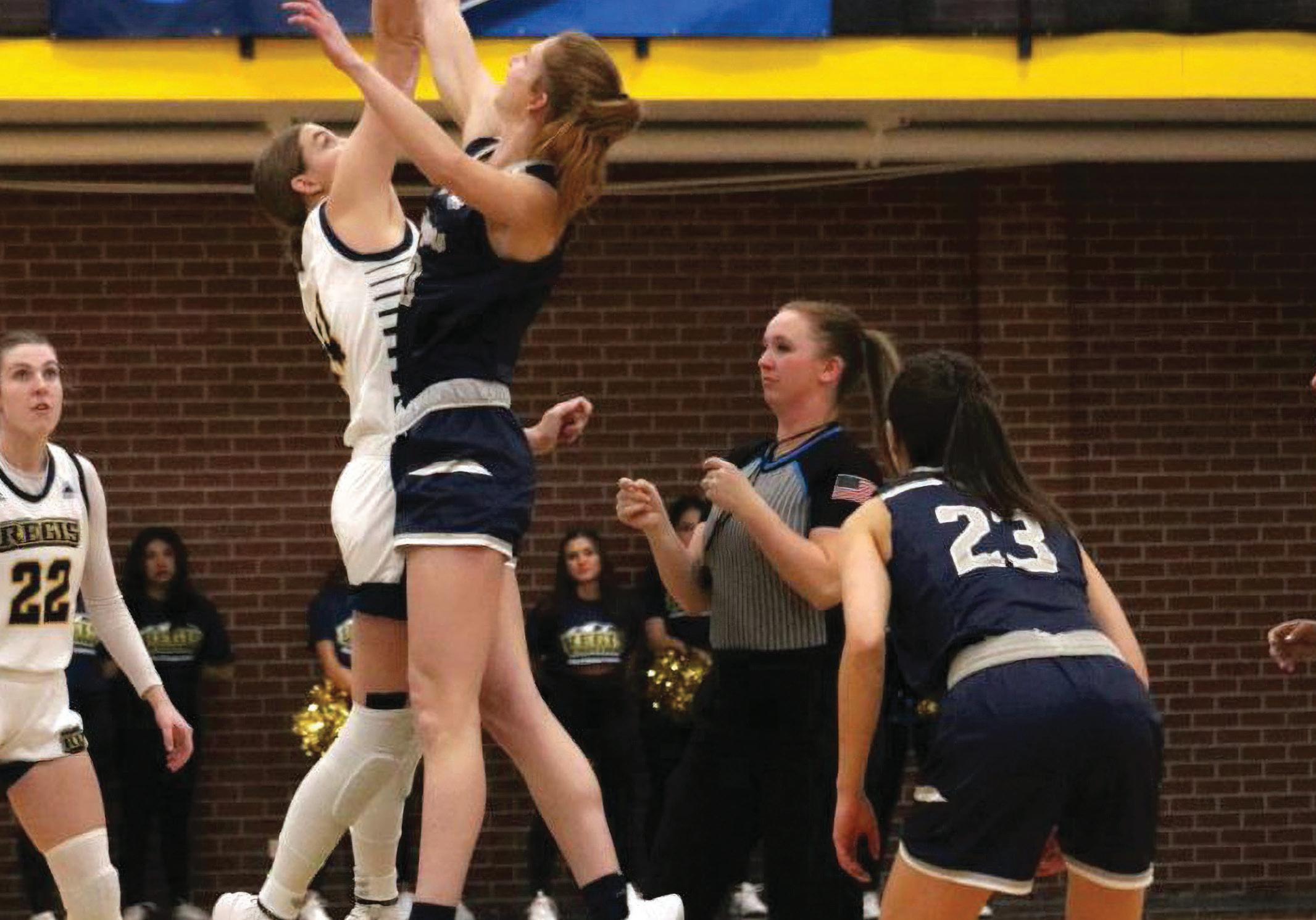
“It was crazy,” said Head Coach Molly Marrin.
 PhotosbyBillyJ.Saunders
PhotosbyBillyJ.Saunders
They did it, Marrin said, by leading the league in rebounding — “That’s my favorite stat,” she said — and by employing “a high-octane offense” led by three women who finished the season with points-per-game averages in double digits: junior Erin Fry, senior Josey Ryan, and senior Sam Deem.

That it all came to an end in heartbreaking fashion — an overtime loss to division rivals Black Hills State University in the first round of the Division II regional tournament — doesn’t diminish the team’s accomplishment, Marrin said.


The Women's Basketball Coaches Association (WBCA) seemed to agree. The association named Fry an AllAmerican Honorable Mention and Marrin a finalist for Coach of the Year.
All that success, particularly after finishing 10th out of 15 in the RMAC last year, surprised plenty of people, likely including a lot of RMAC opponents.
But Marrin believes the 2021-22 season’s struggle prepared this year’s team to succeed.
“We had an eight-game losing streak. It was brutal,” she said. “I had hard conversations with our girls.”
But despite the discouraging outing, only one player entered the transfer portal after that season. “Having them stay and be committed to us when hard things hit was huge. This year, we were like, ‘Oh we got this,’” Marrin said.
One who stayed was Fry, and the good news for Rangers fans is that she was a junior this year, and Marrin expects her to returnalong with potentially eight other players. In other words, the youth and inexperience that helped make 2021-22 such a slog, and the pandemic that made 2020-21 awful for everyone but provided collegiate players additional eligibility, paid dividends this year, and likely will keep on paying them next year.
The coach of the year finalist will be sticking around at least that long. Before she was a coach, Marrin played for, and graduated from, Regis. A product of a Catholic high school in Dallas, she said Regis’ “Jesuit values and social justice issues were a big pull for me.”
After graduating, she started her coaching career at the University of Northern Colorado in Greeley. Then came years riding the Division 1 coaching merry-go-round — “I was in four states in four years” Marrin recalled, without a trace of nostalgia. After that, coaching at her alma mater is her “dream job.” –KA

REGIS.EDU 31
Though he will likely never leave prison, Jason Bondurant believes earning a degree makes him a role model for other inmates.

32 Spring /Summer 2023 | REGIS UNIVERSITY MAGAZINE
UNBARRED EDUCATION
REGIS PRISON EDUCATION PROVIDES TRANSFORMATION AND INSIGHT TO THOSE ON THE INSIDE — AND THE OUTSIDE
“Due to a multitude of poor life choices, at the age of twenty-five, I was arrested and incarcerated... Taking full responsibility for my life and holding myself accountable to do the work necessary for success is my top priority...I am applying for enrollment to Regis because a formal education will support my goal of being of service to my community…”
That excerpt is not from a typical college application essay.
But Jason Bondurant — Jay to those who know him — isn’t your typical college student. Inside the clattering, clanging halls of Colorado Territorial Correction Facility in Cañon City, Colo., Bondurant is what’s known as “life without.” That’s shorthand for the sentence handed down to him in 2007: Life without the possibility of parole.
Nevertheless, Bondurant got accepted to college. In 2022, he became one of the first incarcerated students enrolled in Regis University’s Virtual Inside/Out program. Launched by the University’s School for Professional Advancement (SPA) in cooperation with the Colorado Department of Corrections (DOC), the program offers five liberal arts courses, one at a time, in eight-week terms, to up to 20 incarcerated men and women at four Colorado prisons. All must be approved for participation by prison officials.
 BY KAREN AUGÉ PHOTOS BY CHRISTIAN MURDOCK
BY KAREN AUGÉ PHOTOS BY CHRISTIAN MURDOCK
REGIS.EDU 33
Through internet access and laptops provided to them, the incarcerated students learn simultaneously with, though not alongside, students who attend the classes in person on the northwest Denver campus. Regis students are the “out” portion of the Inside/Out program.
Bryan Hall, Ph.D., dean of SPA and a philosophy professor, said the program benefits Regis students as well as incarcerated people. Both gain insight from the different perspectives and lived experiences of classmates they encounter on the other side of computer screens, he said. Virtually mingling incarcerated and non-incarcerated students “creates a radically diverse and powerful learning experience” for both groups, he said.
“Programs like this do a lot to promote human dignity and transform the people who go into them,” Hall said.
Though the number of people in prisons and local jails in the United States declined in 2019 to just under 2.1 million according to the U.S. Department of Justice (DOJ) Bureau of Justice Statistics, the country’s rate of 810 prison or jail inmates for every 100,000 adults remains the world’s highest.
It’s important to remember, however, that “Ninety-five percent of those individuals will return to the community,” said Moses “Andre”
Stancil, executive director of the Colorado Department of Corrections, and a two-time Regis graduate.
“If the system is such that we isolate them from community partners and community involvement and then we just release them back into the community, just think about how devastating that can be. For them, and for the community,” said Stancil, who earned a bachelor’s degree in behavioral science from Regis in 2002, and a master’s in criminal justice in 2009.
Life after release often doesn’t go well. The federal Bureau of Justice Statistics (BJS) tracked 50,500 people released from federal prisons in 2010. Of those, more than onethird had not found a job four years after being released. For those without a prison record, the overall unemployment rate in 2010 was 9.6 percent. It’s no wonder then, that, according to the RAND Corp., more than half of those released return to prison within three years.
“We don’t rehabilitate people in this country,” said Rev. Thomas Curran, S.J., of the St. Peter Faber Jesuit Community at Regis. “We incarcerate. We warehouse. Then we hope that when someone is released, they desist in committing a crime.”
The national debate over the goal of prison — to punish or to rehabilitate — likely won’t be settled anytime soon. But on his watch, Stancil has made it clear the matter is not up for discussion. “With every new class of staff, the main point I make is, ‘If you took this job because you believe you are here to punish people, take your things and leave now,’” he said. “We’re here to focus on providing the resources to return them to the community as better citizens.”

There are a few staff within the state’s prisons who grumble about providing free education to offenders, Stancil said, but most see the benefits for everyone involved.
Stancil doesn’t need research to confirm that. “From my 30 years
“We don’t rehabilitate people in this country. We incarcerate. We warehouse. Then we hope that when someone is released, they desist in committing a crime.”
Rev. Thomas CUrran, S.J.
working in prisons, I know that when an incarcerated individual is busy, it’s a safer environment for staff, and for the incarcerated individuals.” As every parent knows, Stancil said, when people have lots of idle time, they can fill it with positive activities, or not-so-positive activities.
Inside/Out’s incarcerated students come to class with an assortment of educational backgrounds. A few have taken college classes, often in prison. Many have a high-school equivalency certification. Some have neither. Nationwide, a majority of those serving time – 64 percent –have high school diplomas, according to a 2019 study by the Vera Institute of the Georgetown Center on Poverty and Inequality. The other side of the coin, of course, is that 30 percent of incarcerated people have not graduated from high school — a rate more than twice that of Americans walking around outside prison walls.
Whatever background they bring, Assistant Communications Prof. April Samaras makes sure all her students — both inside and out — leave her class equipped to learn at the college level. In Communications 212: The Skilled Learner, she guides them in learning how to study, how to craft an essay, how to keep a journal. How to think. Woven through
it all is Regis’ guiding value, Cura Personalis. For many, especially those inside, the concept of care for the whole person isn’t one they have experience with, she said.
“We do a lot of reflective journal writing, talking about where they are, where they want to be,” Samaras said. She asks them to write to their younger selves and to describe what they might do differently, given the chance.
The results can be almost as rewarding for the instructor as for the students. “Many of them step into an uncomfortable space and really open up,” Samaras said. The class “gives them a safe space and a place to imagine opportunities.”
Regis instructors don’t receive additional pay for Inside/Out teaching, but the hours do count toward their contractual obligation, Hall said.
Last December, the first group of Inside/Out students to complete their classwork put on mortar boards and graduation gowns and collected the Certificate of College Readiness during a ceremony at the Colorado Territorial Correction Facility in Cañon City. Jason Bondurant spoke at that ceremony.
As the Cañon City Daily Record reported, Bondurant referenced the dark green scrubs that are his daily prison uniform when he said, “I wear these clothes that represent the worst day of my life.” But the
graduation gown he wore that day represented potential, and hope. “This is who we have become,” he said.
That worst day was Aug. 25, 2005. Bondurant had gone to the home the mother of his three young sons shared with her mother and father, hoping, he later said, to see his boys. There was a confrontation, and Bondurant shot and killed the stepbrother of his former girlfriend and a man Bondurant believed she was seeing.
Should the loved ones of those dead men question the investment of resources and care in Bondurant, who is serving a life sentence, Curran said he would answer simply that the prison work is about “a conversion of humanity. We don’t help ourselves by saying ‘I’m not going to see that person as a human.’ In doing that we diminish our own humanity. Let’s make a collective effort to make sure this doesn’t happen to another family.”
The Inside/Out program may be new, but Curran, who now is involved with that program, is a veteran of prison education efforts. As president of Rockhurst University, he launched a partnership with the Missouri Department of Corrections to provide educational opportunities for incarcerated women and staff at the Chillicothe Correctional Center, an all-female facility northeast of Kansas City, Mo. He is presently
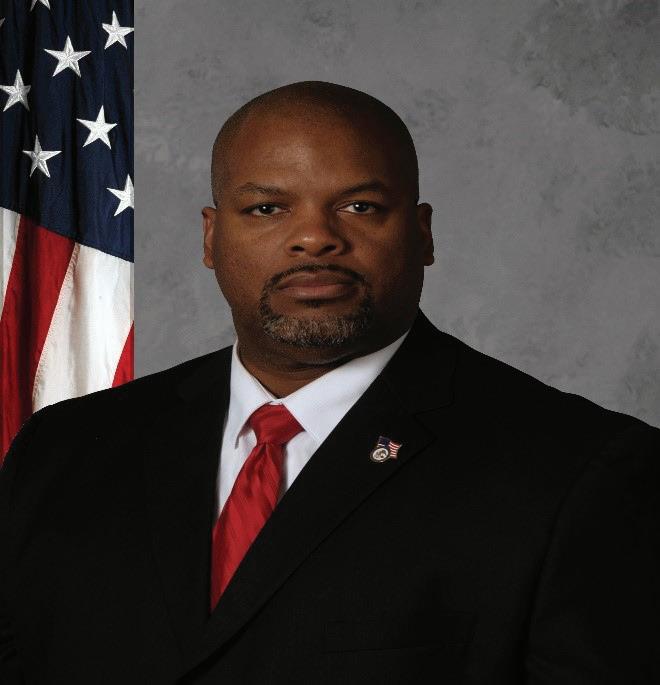
REGIS.EDU 35
"We're here to focus on providing the resources to return them to the community as better citizens."
Moses "Andre” Stancil Colorado Department of Corrections
Courtesy: Colorado Department of Corrections
coordinator of the Jesuit Prison Education Network (JPEN), which currently includes six colleges and universities.
“My goal is to get all 28 [Jesuit universities] to adopt a prison,” Curran said. The network can take steps toward that goal with its $290,000 share, over three years, of a $1.2 million grant from the Jesuit Social Research Institute.
The money will go toward prison education necessities like technology, teacher pay and administration costs. It won’t fully cover those costs, which is why Curran and Hall say it is important to start small when it comes to education programs.
For 26 years, incarcerated students were barred from receiving federal financial aid, known as Pell Grants, to help pay for their education. During the ban, enacted in the early 1990s during a frenzy of “get tough on crime policies,” the number of prison education programs in the country shrank from 772 at the beginning of that decade to eight in 1997, according to a Vera Institute study.
In 2020, Congress reversed the ban, a move the Association of Jesuit Colleges and Universities advocated. Hall said full reinstatement of the grants is expected by July, and Inside/Out is applying for a share of those funds.
Jesuits trace the tradition of educating the incarcerated to St. Ignatius, who was himself imprisoned. One of Ignatius’ alleged crimes was preaching without the proper credentials — in other words, potential heresy. “During his imprisonment he realized education and credentials would give him greater authority,” Curran said.
Prison education worked for St. Ignatius, and it seems to work for the less divine as well. Individuals who participate in post-secondary education programs in prison are 48 percent less likely to be sent back to prison than those who don’t, according to a study published in the Journal of Experimental Criminology. They also are 12 percent more likely to get a job.
“It is hard to overstate the benefits of providing postsecondary education to incarcerated students,” according to the Brookings Institution authors of a 2021 study, ”The Societal Benefits of Postsecondary Prison Education.”
There are quantifiable results of prison education. Then there are impacts that can’t be measured.
Jason Bondurant likely will never be released from prison. He won’t put what he learned in Inside/Out to work in a profession on the outside. Still, he has said, and Hall agrees, that education has meaning for incarcerated people like him.
“Jay feels like he has a role. That he’s been called to help those incarcerated not to come back.”
Stancil sees that with many individuals who know they likely will never see the outside of prison. “Believe it or not, a lot of our longterms are some of the best mentors,” he said. “They know they’re not going anywhere, and they have the greatest desire for a safe environment. And they deserve a safe environment.”
On his application for admission to the Inside/Out program, Bondurant stated he hoped to earn a degree in philosophy and apply that knowledge to his work in the prison’s restorative justice program.

And he concluded that essay by saying:
“Even though I am trapped in this world, condemned to push a stone up a mountain for eternity, I am happy. My effort is not futile…As Camus so eloquently states…‘The struggle itself toward heights is enough to fill a man’s heart.’”
36 Spring /Summer 2023 | REGIS UNIVERSITY MAGAZINE
Left to right: Jason Bondurant, Steven Johnson, Ian Hanson and Michael Syberston celebrate being members of Inside/Out's first graduating class.
PRESIDENTIAL INAUGURATION
Regis University welcomes the Ranger family for a celebration and the formal installation of its 27th president, Salvador D. Aceves, Ed.D.

Join us on our Northwest Denver Campus for the following events in conjunction with Blue & Gold Weekend:
THURSDAY
September 21
3–5 p.m. Missioning of the President and Mass of the Holy Spirit
5–6 p.m. Reception
FRIDAY
September 22
10 a.m.–12 p.m. Inauguration Ceremony
12 p.m.–3 p.m. Inauguration Celebration Picnic
Visit regis.edu/inauguration for full event details.
ART FILM
Regis instructor pays tribute to artists
BY KAREN AUGÉ
Miriam Kapner recalls the piercing, toxic smell that lingered at Ground Zero for weeks. She remembers the faces in photographs smiling out from haunting — and by then, hopeless — flyers taped up seemingly everywhere by people desperate to find missing loved ones.
What Kapner — now an affiliate oboe instructor at Regis — doesn’t remember is what she played the morning she joined dozens of artists and musicians who gave their time and risked their health to comfort

the first responders sifting through rubble in the aftermath of the September 11 attacks. She doesn’t remember the music she played — with one exception.
“There was a firefighter…covered in ash. After we were done, he spoke up and said, ‘do you guys know Ave Maria?’”
Kapner and her woodwind quintet didn’t have the music, but their bassoonist began finding the notes from memory. Kapner joined, and the group poured out Franz Schubert’s worshipful, mournful music “as best we could by ear.”
More than two decades later, Kapner worked with University of Nevada Las Vegas film Prof. Brett Levner and her students — many of whom weren’t yet born when terrorists flew planes into the World Trade Center, and none of whom are old enough to remember that day — to tell the stories of some of those musicians and artists.
38 Spring /Summer 2023 | REGIS UNIVERSITY MAGAZINE
who brought healing after 9/11
Photo: Skip Stewart
Music, if nothing else, gives
so close together, and my brain made the connection of, ‘oh, this is why they died,’ I thought there should be a lasting tribute to their work and to their courage,” Kapner said in an interview.
The crisp fall morning when the towers fell and the world changed, Kapner was unpacking, trying to get settled in a new apartment uptown. Months earlier, she had completed her master’s degree at the Manhattan School of Music, and was building a career as a freelance oboist in New York, her hometown.
Later, when the call went out for volunteers to play at St. Paul’s Chapel, blocks from Ground Zero, Kapner said she didn’t hesitate. “We all felt so helpless. We didn’t know what to do. That was one thing I knew I could do,” she says in the film.
Marya Columbia spent eight months playing at St. Paul’s. The chapel, blocks from Ground Zero, survived the attacks, much as it escaped a fire that swept through lower Manhattan on a September night in 1776. In 2001, it became an impromptu rest station for first responders, where they could grab a bite to eat or take a quick nap. And listen to music.
The resulting documentary short film, Out of the Darkness, which Kapner is executive producer of, and which she composed music for, has been selected for screening at the 15th New York City Independent Film Festival in June and at this summer’s Oregon Documentary Film Festival.
“I think that people don’t realize that musicians did so much in the days and weeks and months following 9/11, that musicians and artists were part of the recovery effort as well,” Kapner says in the film. “I think it’s important to pay tribute to people who go above and beyond.”
In the film, Kapner recalls her experience playing for first responders. But the stories of violinist Marya Columbia and visual artist Ken Cro-Ken are told mostly by the loved ones they left behind. Both spent months breathing the toxic air around Ground Zero and both died of lunch cancer, Columbia in 2019, Cro-Ken in 2020. “When Marya and Ken died
Out of the Darkness includes brief portions of an interview Columbia gave shortly before she died. “Music, if nothing else, gives comfort to people who have nothing else,” she says. She is sitting on a couch, her gaunt frame wrapped in a blanket, her head swathed in a purple scarf, her voice is raspy and weak. “I feel really good that I brought at least some people during those eight months some comfort.”
After Columbia was diagnosed with advanced lung cancer in 2018 — a freelance musician like Kapner, Columbia had no health insurance — she applied for free care as a responder under the World Trade Center Health Program, but initially was denied, the New York Times reported. She finally gained coverage as she entered hospice care, the Times stated in her obituary.
For Kapner, good fortune and good friends helped make the film possible by reducing the usually enormous cost of movie-making. Regis Associate Professor of music, Trudi Wright, Ph.D., made campus recording space available. And Levner, an old friend, who is also an experienced filmmaker, transformed Kapner’s idea into a semester project for her students at UNLV. “I feel extremely grateful to her and to her students. Without them, the film would have gone no further than scribblings in my notebook,” she said.
Now, Kapner hopes that gaining an audience at the New York City film festival will help Out of the Darkness attract distributors. Ultimately, she hopes to raise money to expand it from a 15-minute short to a full-length feature film, and tell more musicians’ and artists’ stories. In the meantime, the film is “on the short list of things I’m really proud of,” she said.
One other thing on that list: playing Ave Maria for that firefighter, whose name Kapner never knew.
In the film, she says the moment provided “two forms of pride. Proud that he asked me, proud that we were able to give him what he needed, at least for 30 seconds, for a minute and a half.”
REGIS.EDU 39
comfort to people who have nothing else.”
“
MARYA COLUMBIA 1956–2019













T hree convenient ways to shop! BOOKSTORE REGIS SQUARE FANZONE CLARKE HALL and online at RegisStore.com
FOR MORRIS PRICE, JR., IT'S THE HUMAN IMPACT, NOT THE DOLLARS, THAT MATTER
BY MEREDITH SELL
The common thread through every job he’s held is a focus on improving people’s lives.
Morris W. Price, Jr. remembers his mother speaking these words to him decades ago, when he and his two sisters were home for the holidays. Price was working for DePauw University in Greencastle, Ind., as associate director of admissions, and making less than $30,000 a year. His sisters talked about their jobs — one worked as a lawyer, the other for Boeing. Their year-end bonuses were more than his annual salary. But at DePauw, Price was seeing the difference higher education made for the students he recruited.
DePauw’s president was committed to multiculturalism. “Led by someone who fundamentally believes in this equity issue and pushes that through every aspect of the university…we went from 2 percent students of color to 18 percent,” Price said.






Now vice president of grants for the Colorado Trust, Price must have taken his mother’s words to heart. At the Trust, he oversees grantmaking by an organization Price empowers people and communities throughout Colorado to make change that promotes equity in health and wellbeing.
In 1996, Price returned to Denver, where he grew up, to take a job at the University of Denver. Soon, he became a founding staff member at the Daniels Fund, which runs a college prep and scholarship program that serves students who otherwise wouldn’t consider higher education.
“Not all the kids got a scholarship, but our [thought] was, if we got them into the process and they learned how to access the resources, they would get additional scholarships,” Price said.
He remembers triplets, two of whom initially were chosen to receive scholarships. “We can’t call the house and tell the father, ‘Two of your three kids,’” he said, so they extended the scholarship to all three. Price made the call and the dad answered. The news stunned him so much that he dropped the phone.
Moments like those are why Price says he’s had a “dream career.” But his impact has been felt beyond his workplaces. Price is nearly as wellknown his volunteerism as for his trademark bow ties. He’s served on boards of organizations including
the National Urban League and the Denver Art Museum. He is currently president of the board of First Baptist Church of Denver, and he’s won the Professional Man of the Year Award from the Denver Gay and Lesbian Chamber of Commerce.
In 2003, Price earned a Master’s in Nonprofit Management from Regis, with support from a Colorado Trust fellowship. Today, he sees the longterm effects of his work. He’s run into students he recruited to college who hold prestigious jobs. The father of those triplets, Price learned, was able to retire from King Soopers because of the son who got that third Daniels Fund scholarship. “[The son] graduated from DU, went off to work with Bane Capital, and that year, he [told his dad], ‘I put half a million dollars in your bank account. You’re retired.’”
At one point, Price thought maturing would mean becoming an analytical, left-brain thinker, like his sisters, but he’s grateful he took a different route. Through a mix of providence and circumstance, he stayed on a path that suits who he is: a person committed to fostering human wellbeing in ways that can’t be captured by numbers.

REGIS.EDU 41
Photo: Ellen Jaskol/Special to The Colorado Trust
“Let them make the money. You keep changing the world.”
WHY
| ALWAYS RANGERS
JESUIT MATTERS
Yadira Caraveo has amassed an impressive record of firsts in her 42 years: One of the first in her family to go to college. The first Latina chosen by Colorado voters to serve in Congress. And the first person to represent the state’s new 8th Congressional District. All those milestones took hard work and persistence.
Caraveo’s parents, immigrants from Mexico, raised four children on a construction worker’s pay, and made sure all their offspring went to college. An underdog throughout her Congressional race in the fall of 2022, Caraveo narrowly won, with just 48 percent of the vote. Once in Washington, D.C., a protracted battle over who would be Speaker of the House kept her from being sworn in on schedule.
REGIS PREPARED COLORADO'S FIRST LATINA CONGRESSWOMAN FOR SUCCESS

Now that she has settled into her new job, Caraveo plans to put her experience as a first-generation U.S. resident — and as a pediatrician — to work for her district. Colorado’s new 8th Congressional District stretches from Greeley in the north to suburbs just north of Denver on the southern edge.
As an undergraduate at Regis 20 years ago, politics weren’t exactly at the top of her mind. Then, Caraveo’s goal was to get into medical school; she thought she would spend her entire career treating patients.
“When I came to school here, the motivation was to get the best education possible to prepare me for medical school and help me get into medical school,” Caraveo said during a February visit to Regis. “I have known since I was a little kid that I wanted to
go to college and that I wanted to go into medical school.”
Even as a student, though, Caraveo had a habit of getting involved in political and social causes.
She helped organize fellow medical residents to advocate for better working conditions. And President Barack Obama named her a Champion of Change for her work with the Union of Concerned Scientists enlisting doctors across the country in the fight against climate change. After graduating from Regis in 2003, she was admitted to the University of Colorado School of Medicine and earned her medical degree there in 2009.
Little did she know that becoming a pediatrician would further her interest in politics.
42 Spring /Summer 2023 | REGIS UNIVERSITY MAGAZINE
As her career evolved, Caraveo began to see problems with the health care system that she couldn’t solve on her own. As a pediatrician, she navigated the complicated role of treating children whose parents worked multiple jobs, and of serving patients who struggled with homelessness.
“I was finding every single day that it was difficult to provide services to my patients,” Caraveo said. “It was a very quick realization that I couldn't fix a lot of things as a doctor.”
A desire to fix those larger issues propelled her toward her second career: politics. In 2018 she was elected to represent the 31st district — which lies north of Denver and encompasses much of Thornton in Adams County — in the Colorado House of Representatives. She easily won re-election in 2020.
As a state lawmaker, Caraveo cosponsored legislation to remove financial and other barriers that often prevent physicians from treating patients with complex conditions, including people experiencing homelessness, who normally have little access to care.

She also co-sponsored a bill to regulate procedures for emergency medical personnel who administer ketamine outside a hospital. The safeguards were created following the death of Elijah McClain, a 23-yearold Black man who went into cardiac arrest after an encounter with Aurora, Colo. police led to paramedics injecting him with the sedative. Both bills are now law in Colorado.
Caraveo’s medical training has helped guide her political career, including in her recent committee assignments in Congress. There, she serves on the House Science, Space and Technology Committee and the and Agriculture Committee.
“I'm on the Agriculture Committee, and I'm on three subcommittees on that, including the nutrition subcommittee. As a pediatrician, that's very important to me because I saw, every day, food insecurity,” she said. As a pediatrician in Adams County, Colorado, two-thirds of her patients were on Medicaid. A similar percentage relied on the Women, Infants and Children program and the Supplemental Nutrition Assistance Program. Both of those federal programs provide assistance to needy children and families.
“The Farm Bill is up for authorization this year, and a lot of that is going to have to do with how we continue services to make sure that children have access to healthy food,” she said.
Caraveo, one of 53 Jesuit-educated members of Congress, appreciates the diverse backgrounds of her new colleagues, from lawyers and doctors to immigrants and a mechanic.
“The class that I'm coming up with is very different from some of the previous classes. We're younger,” she said. The median age of new House members is six years younger than the previous Congress. “I think … really improving the states that we're from and, collectively, the United States through Congress, is what they're all focused on, and it’s my focus, as well. So, it's really neat to see the enthusiasm that these people from all different walks of life have for serving in office.”
Caraveo credits her Regis experience with getting her started.
“I've always been very, very proud to be a Regis graduate,” she said. “I think it really made it possible for me to go on to medical school — and then everything that came from it because it was so close-knit and small.”
The close-knit Regis community provided support for the next stage of her career, she said.
“I had lunch with my professors once a week and really knew them so that when they wrote a letter of recommendation, it wasn't just a standard letter, they really understood me and knew why I would be a merit to the medical profession,” Caraveo said. “So, I owe a lot to the school and I'm very happy to be back and to hopefully be able to help the continuation of this mission now that I'm in Congress.” –SK
REGIS.EDU 43 RANGERS IN THE WORLD | ALWAYS RANGERS
Congresswoman Yadira Caraveo visited her alma mater – Regis –this spring, and toured the Rueckert-Hartman College for Health Professions updated Nursing Skills Lab on the Thornton campus.
Photo: Skip Stewart
CLASS notes
David Frees, (RC ’91) was named 2022 Emergency Manager of the Year for the San Luis Valley region. The award was presented by the Saguache County (Colorado) Board of Commissioners, on behalf of the Colorado Emergency Management Association. Frees was recognized, in part, for his work coordinating preparation for the Live Nation Multi-day Music Festival, which was the single largest pre-planned event ever within the six-county San Luis Valley region.
Dave Walsh (ACBC ’91) has joined Parry Labs as vice president of engineering. Alexandria, Va,-based Parry Labs is a defense contractor .
Patrick John Atkinson (ACBC ’00) married Julie Atkinson in Edina, Minn.
Shelly Butcher (RC ’01) has been hired as principal for the new Peakview Elementary School in Windsor, Colo., in the Weld RE-4 School District. She has been principal of Tozer Elementary School since 2014.
The University of Kansas Innovation Park has announced the addition of David Sprenger (RC ’01) as the executive vice president of business development.
Gov. Jared Polis appointed Moses ‘Andre’ Stancil (ACBC ’02, ’09) executive director of the Colorado Department of Corrections (CDOC). Stancil previously served as the department's deputy executive director. Before that, he worked in the Federal Bureau of Prisons from 1998 to 2019. He began his career in CDOC as a correctional officer and served in the United States Army as a Military Police Investigator.
The College of St. Benedict and St. John’s University has hired Kara Kolomitz (RC ’03), as its first joint chief operating officer.
Serena Chan (ACBC ’04) has joined Capco, a global technology and management consultancy, as a partner in its Canadian business.
Anthony Johnson (ACBC ’05) has been appointed to the board of directors for Cyber AB. He previously served as a managing director and chief information security officer for the Corporate & Investment Bank at J.P. Morgan Chase & Co.
Jodi Ibach (RC ’06) has been named the new superintendent of the Fremont County School District #25 in Riverton, Wyo. Ibach, who attended kindergarten through high school in the district, had served as assistant superintendent since 2020.
George O’Clair (ACBC ’06) has been recognized as Faculty of the Year at Morgan Community College in Fort Morgan, Colo. He has taught in the college’s electromechanical technology program since 2019.
Tamara M. Sullivan (ACBC ’06) was appointed by Gov. Jared Polis to serve as county judge for Costilla County in Colorado’s 12th Judicial District. Previously, Sullivan served as managing attorney for the Alamosa County Legal Services Office, where her practice consisted of domestic relations, housing and protection matters.
Donnell G. Bayot (RC ’08, ’09), an administrator with the International School of Hospitality (TISOH) has been elected commission chair for the Accrediting Council for Continuing Education and Training.
Darrel Guadnola (ACBC ’08) has been named chief of police for Commerce City, Colo. He has been in law enforcement for 27 years.
Chaffee County Department of Human Services has named Monica Haskell (RC ’08) director of human services. She brings 25 years of management experience to the role.
44 Spring /Summer 2023 | REGIS UNIVERSITY MAGAZINE
ALWAYS RANGERS | CLASS NOTES ACBC | Anderson College of Business and Computing RC | Regis College RHCHP | Rueckert-Hartman College for Health Professions
Marie Still’s (ACBC ’08) debut novel, We’re All Lying was released in March. Published by Rising Action Publishing, the novel is a thriller about a woman who becomes the prime suspect when her husband’s mistress disappears.

Paul Jiron (RC ’09) was promoted to court operations specialist for the United States Court of Appeals’ 10th Circuit in Denver. In this position, Jiron supervises the oral arguments calendar, monthly financial reconciliation, courtroom operations and special case management.
Gretchen Plut Haskell (RC ’10) and Christopher Haskell and 2-yearold Hollis Haskell welcomed Zuri Gretchen Haskell to their family June 21, 2022.

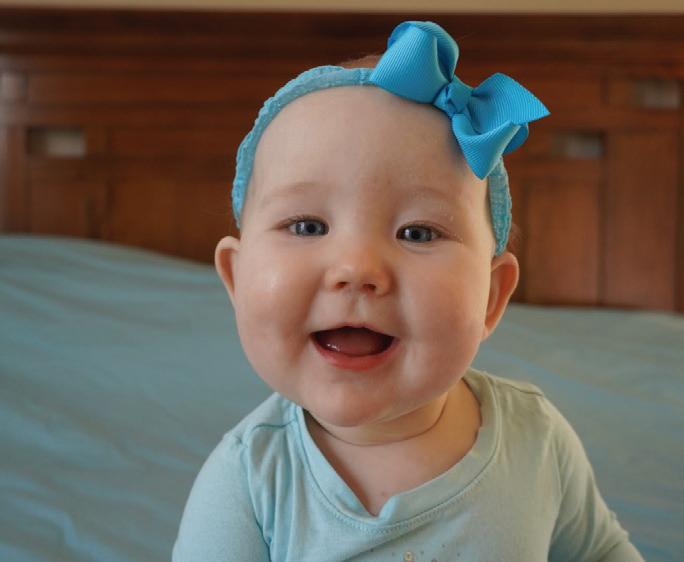
Family nurse practitioner Anna Felton (RHCHP ’11) has joined the St. Johns Health – Lander, a health care clinic in Lander, Wyo.
Nurse practitioner Zane Bendig (RHCHP ’12) joined the hospitalist team at Great Falls Hospital in Great Falls, Mont.
Jessica Sveen (ACBC ’13) has been named chief executive officer of Rocky Mountain MicroFinance Institute (RMMFI). The Denver-based organization provides funding and support for aspiring entrepreneurs and emerging businesses.
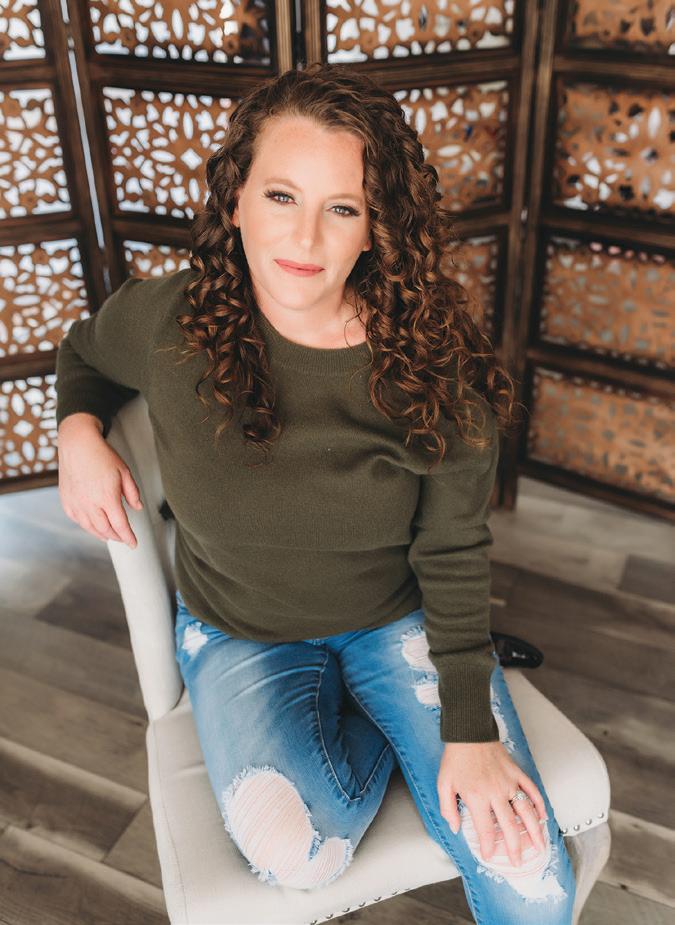
Arapahoe Community College welcomed Maggie Kidnay-Rouse (RC ’15) as a librarian at its Littleton, Colo. campus.
Michael Tremlett (ACBC ’15) has been named president and CEO of Columbia Helicopters, an Oregonbased heavy-lift helicopter operations and maintenance provider.
A story by Kristina Tabor Saccone (ACBC ’18) “Hardy Holds Court at the Corner Store” (Cease, Cows) has been selected for inclusion in the upcoming Best Microfiction of 2023. More information can be found at bestmicrofiction.com
Regis Director of Brand Strategy
Sarah Foley (ACBC ’20) and husband Damien Angel welcomed baby Margot Kate on November 10, 2022.
REGIS.EDU 45 CLASS NOTES | ALWAYS RANGERS Share your milestones with your Regis classmates! Submit information about career changes, weddings, new babies and other notable accomplishments at regis.edu/classnotes
1940s
Marie L. (Donahue) Kane (LHC ’48)
1950s
Salvatore J. Alioto (’50)
Marvin Albert Hegarty (’53)
George A. Hovorka (’54)
James L. Billinger (’55)
Josephine Jean (Panno) Moore (’56)
Robert John Orth (’56)
William R. Earley (’57)
Edward H. Gallegos (’58)
Patricia Marie (O’Shea) Granner (’58)
Mary Ann (Cox) Sanfilippo (’58)
Thelma Mae (Apodaca) Lederhos (’59)
Irene Elizabeth (Carney) Selenke (LHC ’59)
Molly Erin (Chandler) Ware (’59)
1960s
Eugenie Mae (Milan) Allord (’60)
John Michael Tarabino (’60)
Patricia Ann (Tanko) Meiers-Dunning (LHC ’61)
Judith Mon Igoe (LHC ’61)
Robert Ernest Sims (’62)
Helen Marie (Stuart) Faller (’63)
Thomas A. Hopkins (’63)
Charles P. McElroy (’64)
Kathleen Ann (Shannon) Hibbets (LHC ’66)
James Paul Curran (’67)
Kathleen Sue (Lane) Close (LHC ’68)
Karen Patricia Schumer (LHC ’68)
Terry Anne (McNassor) Wilhoft (’68)
Claire Jean (Donnelly) Nix (’69)
1970s
Frances Ellen (McGraw) Grooters (LHC ’70)
Mary Denise (McCarty) Haddon (LHC ’70)
Raymond W. Brisnehan (’71)
Daniel J. Gentile (’73)
Terry A. Hainje (’73)
George A. Honold (’73)
Michael John Horvat (’73)
Joseph L. Chopyak (’74)
Rocco Xavier Smaldone (’74)
Norma Evelyn (Weber) Kern (LHC ’77)
Joseph Louis Abate (’78)
Kevin M. Danaher (’78)
1980s
Douglas Henry Haack (’81)
Lucy Jane Roucis (LHC ’81)
Nancy A. (Tock) Ulvick (’81)
Dale D. Mann (’83)
David L. Abbott (’84)
Enno E. Fritz (’84, ’07)
David Barry Anderson (’85)
William Gregg Simpson (’85, ’87)
Beverly Ann (Tracy) Goering (’86, ’93)
Jamie Michelle (Miskol) Stur (’86)
Russell William Jones (’87)
Robert Eugene Smith (’87)
Janet Louise Harris (LHC ’88)
Joyce Jean Serhan (’88)
Marcia K. (McDowell) Stackhouse (LHC ’88)
1990s
Janice Kay (Lytle) Jenista (’93)
Sheila Gene Lindquist (’95)
Rodney E. Roose (’93)
Bret Joseph Weller (’93, ’01)
June M. (Mosher) Cloud (’94)
Marirose (Matthews) Morris (’94)
Susan Christine (Harendza) Smarr (’95)
2000s
Nadine L. (Allen) DiBacco (’00)
Deborah R. (Floyd) Duffus (’00)
Jennifer Lynn Bransteitter (’03)
Jean C. (Swanke) Symons (’03)
Lorraine Arlene (Roberts) Dickey (’06)
Andrea (Enz) Nicolelli (’08)
2010s
Maura L. Scherrer (’11)
46 Spring /Summer 2023 | REGIS UNIVERSITY MAGAZINE ALWAYS RANGERS | IN MEMORIAM
Always Rangers. Always in our hearts.
MARTHA URIOSTE 1937-2022 | LHC ’58
In May 1958, the Raton, N.M., newspaper featured a photo of a dark-eyed young woman beneath the headline, “Girl to Get Denver College Degree.”
The “girl” was Martha Urioste, who grew up in Raton. The Denver college was Loretto Heights. Although the article noted Urioste’s already impressive achievements – inclusion in Who’s Who of American Colleges and Universities, junior class president – the list pales in comparison to what she ultimately achieved for bilingual education, for children, and for equity in education.
After teaching at Gilpin Elementary School in Denver, Urioste earned two master’s degrees, a doctorate, and was awarded an honorary doctorate from Regis. She taught Spanish on Rocky Mountain PBS in the 1960s and was among the first Latina counselors in Denver Public Schools and the first secondary bilingual coordinator. When she died on Dec. 8, 2022, at 85, Urioste was still working on behalf of education.
As principal of Mitchell Elementary School in the 1980s, she learned the school was not in compliance with court orders to desegregate. As Urioste recalled in an “I Am
Denver” video posted on the city website, “We were told, ‘What are you going to do to make sure white children, middle class children, get on a bus and go to Northeast Denver?’" at a time when that area was economically distressed.
Urioste found the solution: Montessori education. After studying the method in Italy, she instituted the first Montessori program in a Colorado public school at Mitchell.
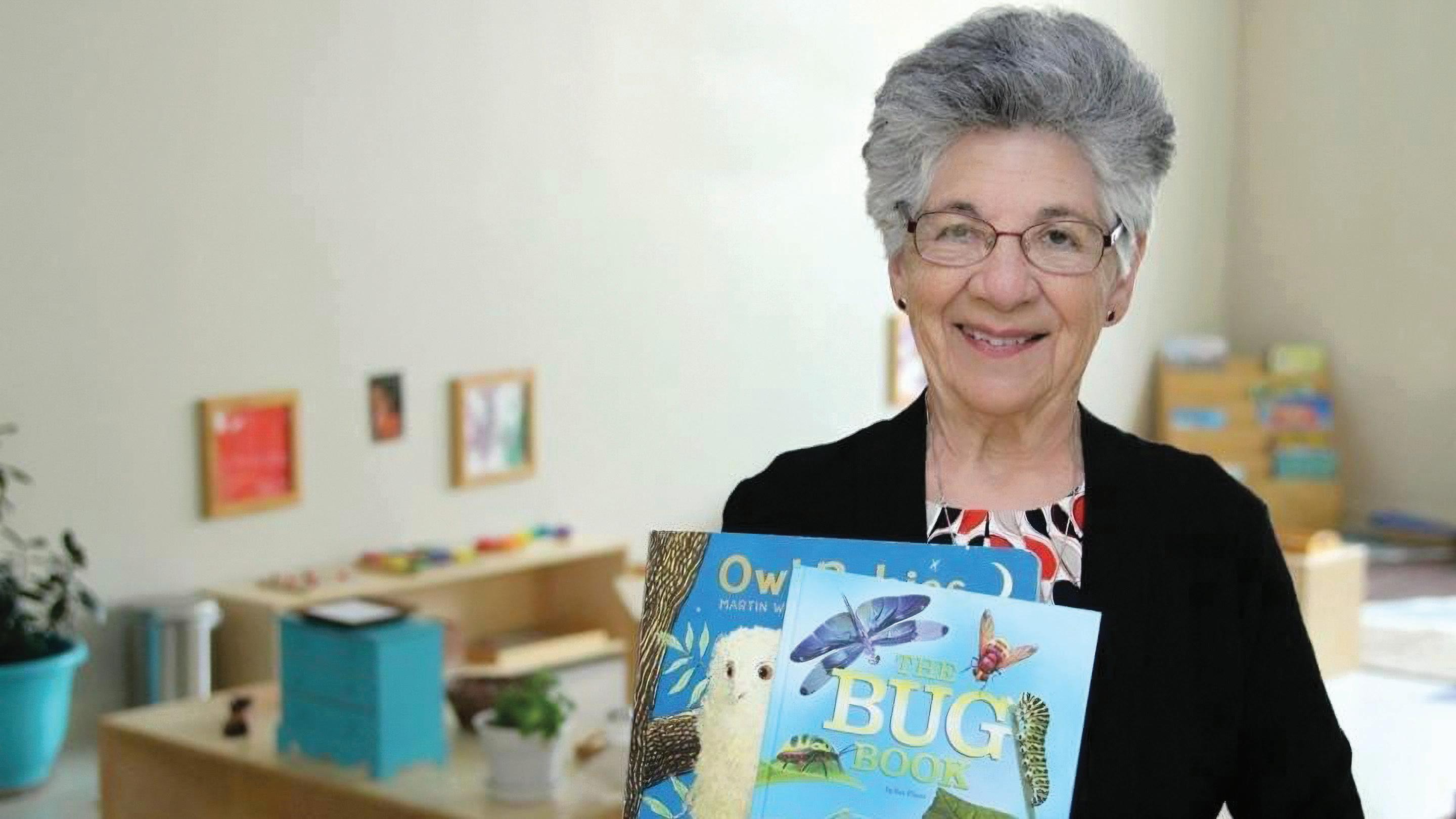
It was so successful that, with help from the community, Urioste bought a nearby building – some called it a “crack house” – transformed it into Family Star, an early childhood Montessori school and trained local parents as teachers.
“She was always instigating good,” said Darlene LeDoux, a longtime Latina educator and friend, told Colorado Chalkbeat.
A tribute on the DPS website said Urioste will be “forever remembered, loved and respected as the guardian of our students and their families.”
In that “I Am Denver” video, Urioste explained why she did what she did. “I became an educator because I love children,” she said. “I always wanted to find a way to help children.”
REGIS.EDU 47 IN MEMORIAM | ALWAYS RANGERS
Courtesy: Latino Leadership Institute/DPS
Dear Regi – This is painful to admit but social media has cost me my closest friend. She has mentally checked out. This is not an exaggeration. Our conversations now revolve around rumors and conspiracy theories. Despite my desperate attempts to reconnect on a human-ish level, my friend is so engrossed with her phone that she has become a shell of her former self. I am afraid I will lose other friends in the same way. What can I do to make sure that doesn't happen?
Holy hole in a donut, Batman! I hear you. It's disheartening to see so many people losing their marbles and falling for all sorts of baloney, even the kind with olives in it. But I understand your frustration and sympathize.
Let me offer you a chicken nugget of wisdom. It's essential to never stop questioning things, no matter how completely normal or totally absurd they seem. I'll bet dollars to donuts your professors will back me up. Blindly accepting what others tell you without questioning it can lead to all sorts of problems.
Let's be real. Social media can be a load of dumpster dookie. It's turning us into different creatures – all judgey, critical and brainwashed. It's just not a good look for anyone, no matter what the next big fashion trend turns out to be. We're stuck with social media, so let's at least try to keep our own behavior in check before we become lie-infected clicker zombies.
Finding the truth nowadays is like trying to find a needle in a stack of needles. It's sticky, but don't lose hope, my friend.
As tempting as it sounds, please don't get sucked into the rabbit hole of conspiracy theories and ugliness. (Everyone knows fox holes are far superior to rabbit holes anyway.) Keep an open mind, be willing to listen to new ideas and perspectives, but question them and use your own brain.

Just because some monkey has a fancy title, that doesn’t mean you should blindly trust them – first find out where that title came from: was it an actual learning institution? Or their own imagination? Check your sources, because everyone's got an angle, whether it's for likes, clicks or attention. Trust has to be earned and your own instincts are your greatest attribute.
Also, be kind to people. Yes, it sounds simple, but why is nice a toxic thing nowadays? Unplug occasionally and rediscover what it means to be human-ish. A rule of paw I live by is never say anything on social media you wouldn’t say to the person’s face. Get back to true nature and appreciate the simple things. And nature is trending now. I saw that on the internet. ;-)
So, let's take action. Tonight, take your friend's phone and hide it. Then say you're sorry, but it was for their own good. Help your friend; fill your minds with non-AI generated nature scenes and keep your eyes and heart open. Stay positive and hopeful. Let's team up like a pack of enthusiastic squirrels and create a positive impact that even the nuts will appreciate!
Peace & carrots,
48 Spring /Summer 2023 | REGIS UNIVERSITY MAGAZINE
Q: A: ALWAYS RANGERS | ASK REGI
 Once again, Ranger Day made a splash on campus. The study break that is one of Regis favorite traditions returned in April with music, games, go-carts and the real-life, and real wet, version of Battleship.
Photo: Skip Stewart
Once again, Ranger Day made a splash on campus. The study break that is one of Regis favorite traditions returned in April with music, games, go-carts and the real-life, and real wet, version of Battleship.
Photo: Skip Stewart
Non-Profit Org. U.S. Postage PAID Denver, CO Permit No. 3092 3333 Regis Blvd., Denver, CO 80221-1099 Come back to where it all started. Earn a graduate degree from Regis. The excellence in education you already know, with the flexibility you need. Advance your career with a Regis graduate degree or certificate, designed to work with your busy life. Explore programs in business, computing, education, health care, humanities, social sciences and more. View our program options at regis.edu/programs































































































































































































 PhotosbyBillyJ.Saunders
PhotosbyBillyJ.Saunders





 BY KAREN AUGÉ PHOTOS BY CHRISTIAN MURDOCK
BY KAREN AUGÉ PHOTOS BY CHRISTIAN MURDOCK




























 Once again, Ranger Day made a splash on campus. The study break that is one of Regis favorite traditions returned in April with music, games, go-carts and the real-life, and real wet, version of Battleship.
Photo: Skip Stewart
Once again, Ranger Day made a splash on campus. The study break that is one of Regis favorite traditions returned in April with music, games, go-carts and the real-life, and real wet, version of Battleship.
Photo: Skip Stewart










